Iris Featured in ZDF’s heute journal
11 Feb 2025 • Patrick Bassner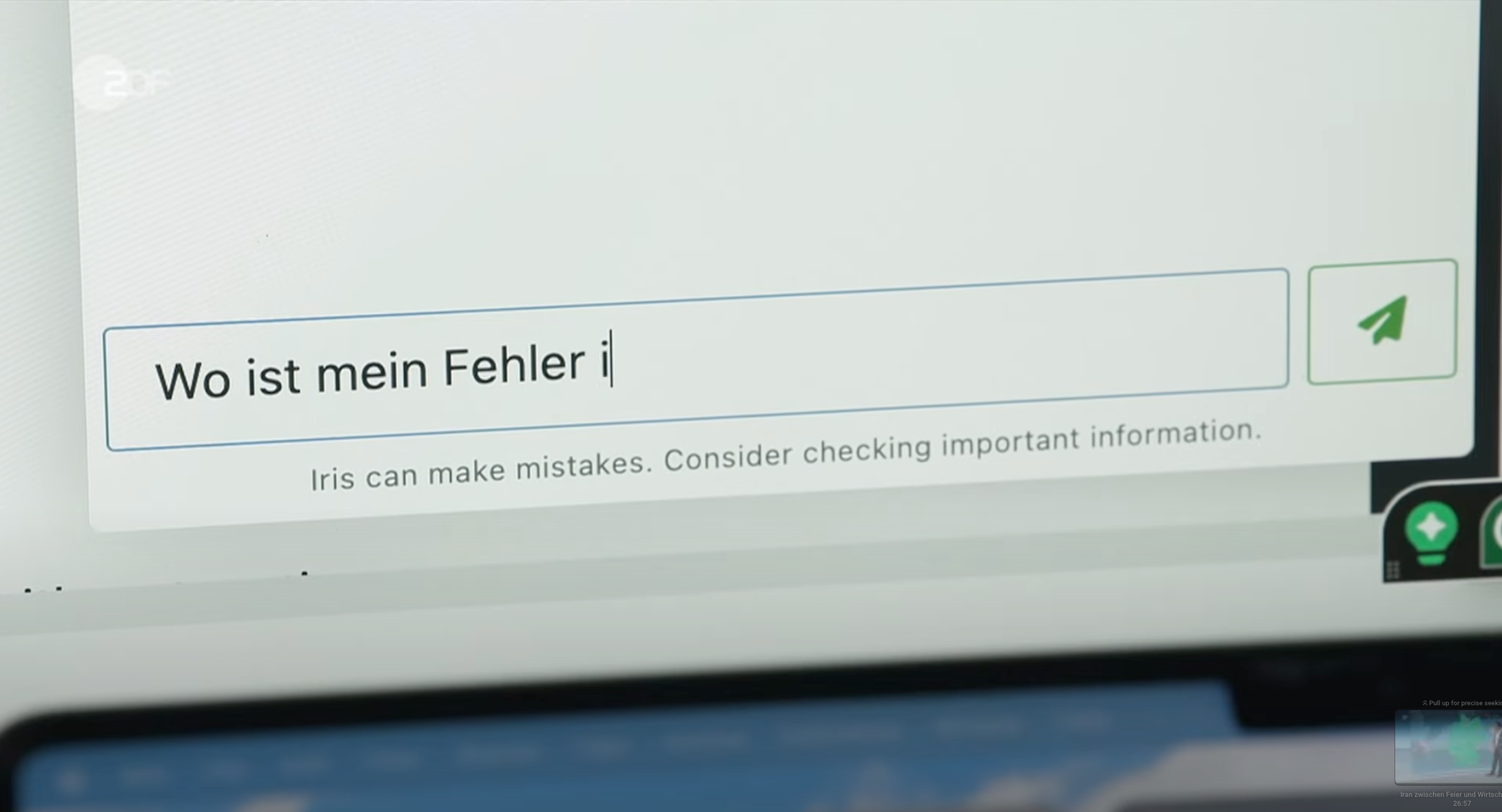
Iris, the AI-powered virtual tutor integrated into Artemis, was recently featured in a report on heute journal, the renowned news program on ZDF. The report highlights how Iris is transforming university education by offering AI-driven tutoring to students at the Technical University of Munich. Watch on AI Tutoring at TUM: How Iris Supports Students The report showcases how students use Iris as a virtual tutor to assist with programming assignments. Unlike traditional tutors, Iris is available 24/7, providing guidance through counter-questions and structured hints rather than directly delivering solutions. This method helps students enhance their problem-solving skills while maintaining active engagement in the learning process.
Stephan Krusche receives TUM's Angela Molitoris Diversity Award
21 Nov 2024 • Stephan Krusche
The Technical University of Munich (TUM) has honored Stephan Krusche with the Angela Molitoris Diversity Award. The prize recognizes outstanding achievements in the fields of equal opportunities, and diversity. The prize is awarded to TUM employees who are particularly committed to promoting women and strengthening diversity in science and teaching. The prize is named after Angela Molitoris (1912–2002), the first female syndic and first female chancellor of TUM, who was committed to the advancement of women in science throughout her life.
TheiaCon 2024 - Reducing Entry Barriers for Online Programming Exercises - Theia in an Education Environment
14 Nov 2024 • Matthias Linhuber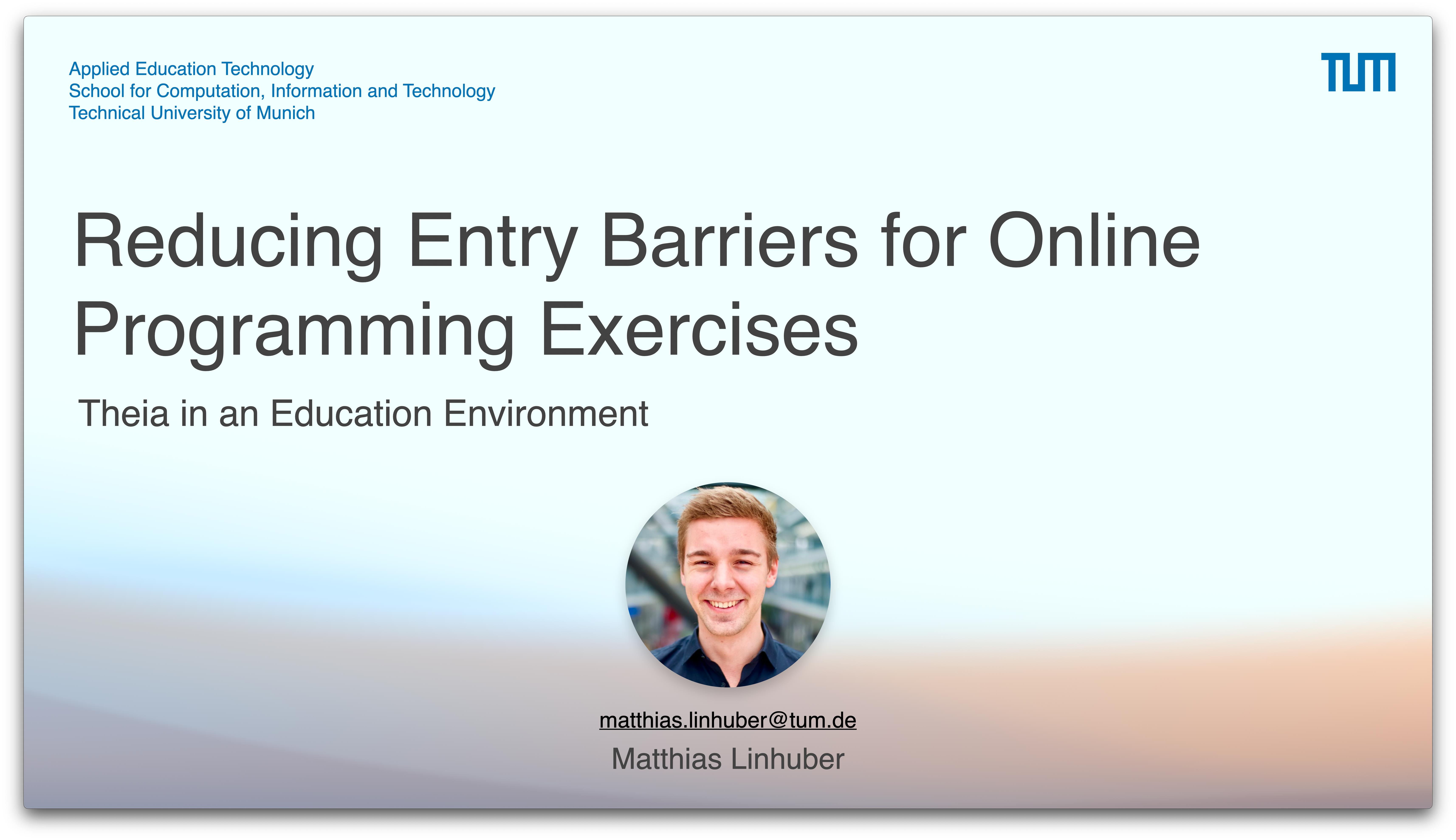
Matthias Linhber gave a presentation at the TheiaCon24 showing the integration of Theia and Theia Cloud within Artemis, demonstrating how it creates a scalable, secure, and highly customized learning environment for software engineering education. Abstract The growing complexity of advanced courses in software engineering often creates frustrating entry barriers for students unfamiliar with IDEs and programming in general. To address this, we utilize Theia within the online exercise platform Artemis to provide a cloud-based environment that simplifies setup and supports tailored learning experiences. Our approach includes tailored variants of the Theia IDE and a dedicated Artemis plugin that delivers real-time instructions and feedback, allowing students to concentrate on core competencies. By leveraging Theia Cloud’s scalable integration in Kubernetes, we provide a secure environment with precise resource allocation, enabling efficient terminal access and controlled execution for students.
Koli Calling 2024 - Paper Accepted - Transforming Computer-Based Exams with BYOD: An Empirical Study
12 Nov 2024 • Maximilian Sölch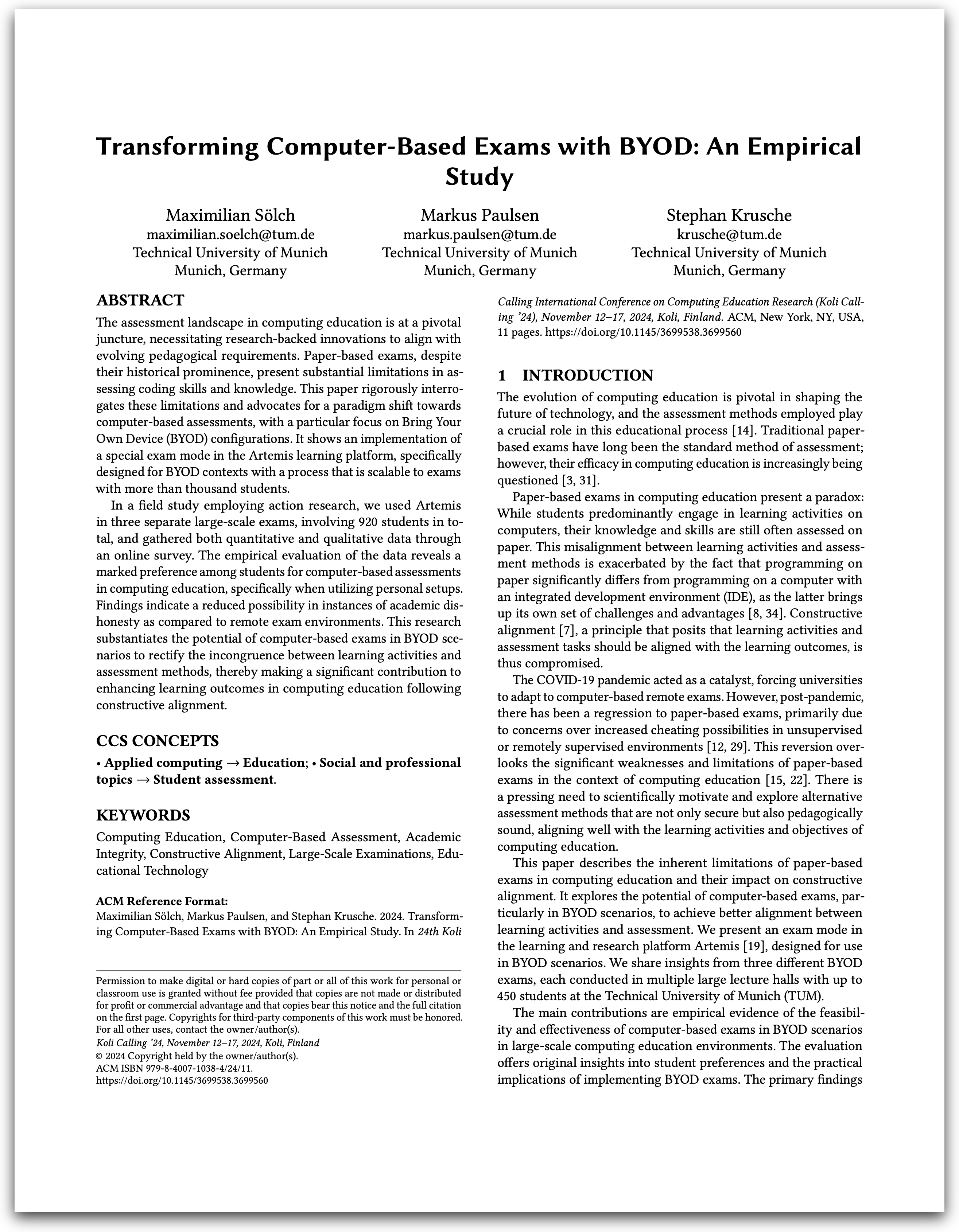
We are excited to announce that our paper, “Transforming Computer-Based Exams with BYOD: An Empirical Study,” has been accepted for presentation at the Koli Calling International Conference on Computing Education Research in Finland this year! This research tackles a pressing challenge in computing education: the constraints of traditional paper-based exams in assessing coding skills and technical knowledge. In response to these limitations, the study presents an innovative approach using Bring Your Own Device (BYOD) setups for computer-based assessments, supported by a custom-built “exam mode” in the Artemis learning platform. This feature is designed specifically for scalability, successfully handling exams with over a thousand students.
Launching GenAI Talks: Where AI Enthusiasts Connect and Innovate
27 Aug 2024 • Felix T.J. Dietrich
On August 19th, our research group hosted the first session of the GenAI Talks series at the ITüpferl in the MI Building. The event aimed at fostering connections among students, researchers, and industry professionals interested in Generative AI. The evening featured six insightful lightning talks, each lasting around five minutes, followed by lively discussions and networking opportunities. The diversity of topics covered—from biases in Generative AI to the intricacies of multimodal LLMs—sparked rich exchanges of ideas and set the tone for future sessions.
IRIS in the news: Süddeutsche Zeitung, Mindshift Magazine, and TUM
1 Aug 2024 • Ignacio Garcia
IRIS, the intelligent virtual tutor integrated into Artemis and based on Generative AI and Large Language Models, was recently featured in an article published by the Süddeutsche Zeitung and in the 8.th edition of the Mindshift Magazine. The articles present the concept behind the development of IRIS and highlight the capability of IRIS to be a virtual tutor for university courses. The Süddeutsche Zeitung published an article titled “Hilfe ja - Lösung nein” about the challenges that the development of a learning chatbot like IRIS poses. Considering that IRIS is used on courses with more than 2000 students and that the tutors are not able to provide individual support to all students, a learning chatbot like IRIS can be very valuable for the students and tutors. The implementation of the chatbot should however be done carefully, in order to offer a learning experience that is on par with the one provided by human tutors. Because of this, the focus of the article is on the learning concept behind IRIS, which is based on the idea of helping the students to learn by themselves and on how IRIS implements this concept of learning psychology into its answers. This is achieved by designing the chatbot so that it provides relevant information for solving problems and carefully guiding the students towards the solution, without providing the solution itself. Through this approach, the students are encouraged to think critically and will learn more effectively, as they are actively involved in the learning process.
We want you! Looking for tutors for Introduction to Programming in WS24-25 👩🏼🏫🧑🏻🏫👨🏾🏫🚀
27 Jun 2024 • Ramona Beinstingel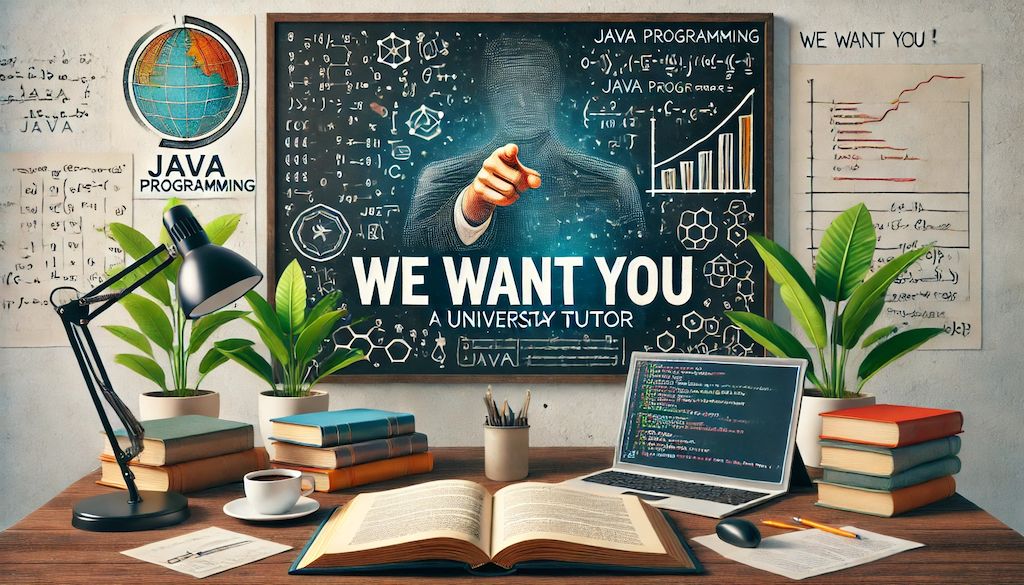
Are you passionate about education and eager to make a difference in the academic journey of students? We invite motivated students like you to join our team as a tutor for Introduction to Programming and play a key role in shaping the learning experience. This is a unique opportunity to deepen your software engineering and programming skills while helping your peers. Join us and become a valuable member of our highly motivated, international student team! 🚀
Santiago Berrezueta wins "Best Presentation" award at the 2024 IE Conference
25 Jun 2024 • Ignacio Garcia
The International Conference on Intelligent Environments (IE) is held annually at different locations around the world, and focuses on research in the field of interactive spaces made possible by the use of different technologies. Artificial intelligence, communication technologies, and sensing interfaces, along with more contributions from multiple disciplines, allow for the design of intelligent environments that can enrich users’ activities and interactions. The 20th edition of the conference was held during June in Ljubljana, Slovenia, and awarded distinctions to the best papers and presentations. Santiago Berrezueta was awarded the "Best Presentation Award" for his talk based on the paper “Exploring the Efficacy of Robotic Assistants with ChatGPT and Claude in Enhancing ADHD Therapy: Innovating Treatment Paradigms”, co-authored by himself, Mohanad Kandil, María-Luisa Martín-Ruiz, Iván Pau-de-la-Cruz, and Stephan Krusche.
Felix T.J. Dietrich Wins Apple's Swift Student Challenge 2024
7 Jun 2024 • Stephan Krusche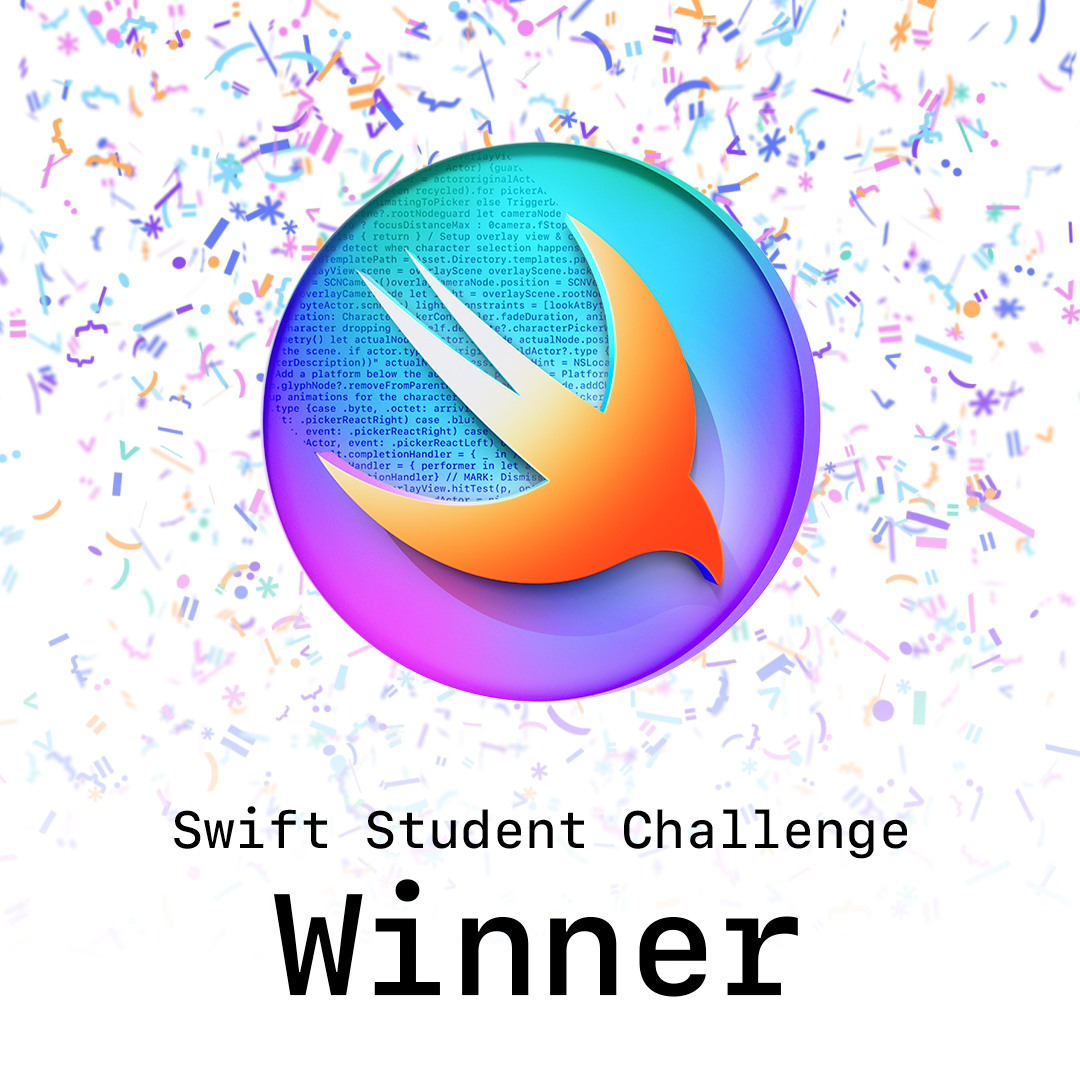
We are pleased to announce that Felix T.J. Dietrich has earned a spot in the Swift Student Challenge 2024. This competition, part of Apple’s annual Worldwide Developers Conference (WWDC), recognizes innovative projects by student developers worldwide. Felix’s project, an iPad app designed to improve financial health, secured him one of the 350 scholarships. The Swift Student Challenge allows students to showcase their coding skills by creating a Swift Playgrounds project. Winners this receive a year of free access to the Apple Developer Program and Apple AirPods Max. Distinct winners, top 50, even get to fly to California for attending the WWDC in person.
ITiCSE '24 - Paper Accepted - Iris: An AI-Driven Virtual Tutor for Computer Science Education
15 Apr 2024 • Patrick Bassner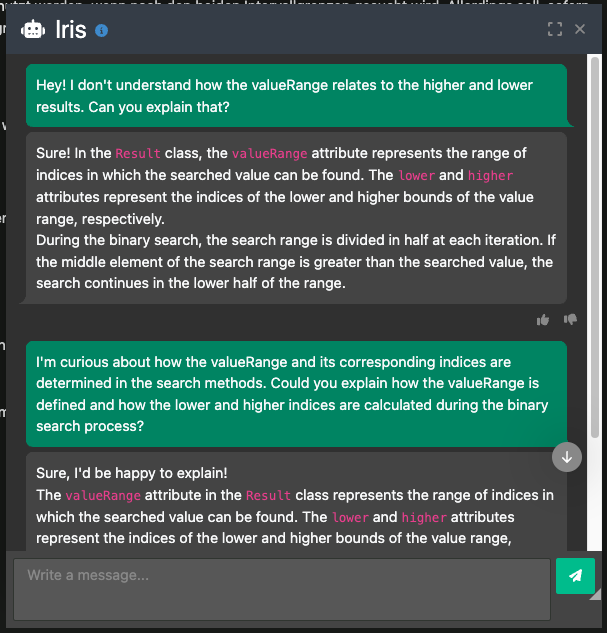
We are excited to announce the acceptance of our research paper titled “Iris: An AI-Driven Virtual Tutor for Computer Science Education” at ITiCSE 2024! In this innovative research, we explore the integration of Iris, a chat-based virtual tutor, within the Artemis learning platform. This development addresses a critical challenge in computer science education: the need for personalized, context-aware learning experiences that can adapt to individual student needs in large-scale educational environments.
Future of ADHD Care: Evaluating the Efficacy of ChatGPT in Therapy Enhancement
20 Mar 2024 • Santiago Berrezueta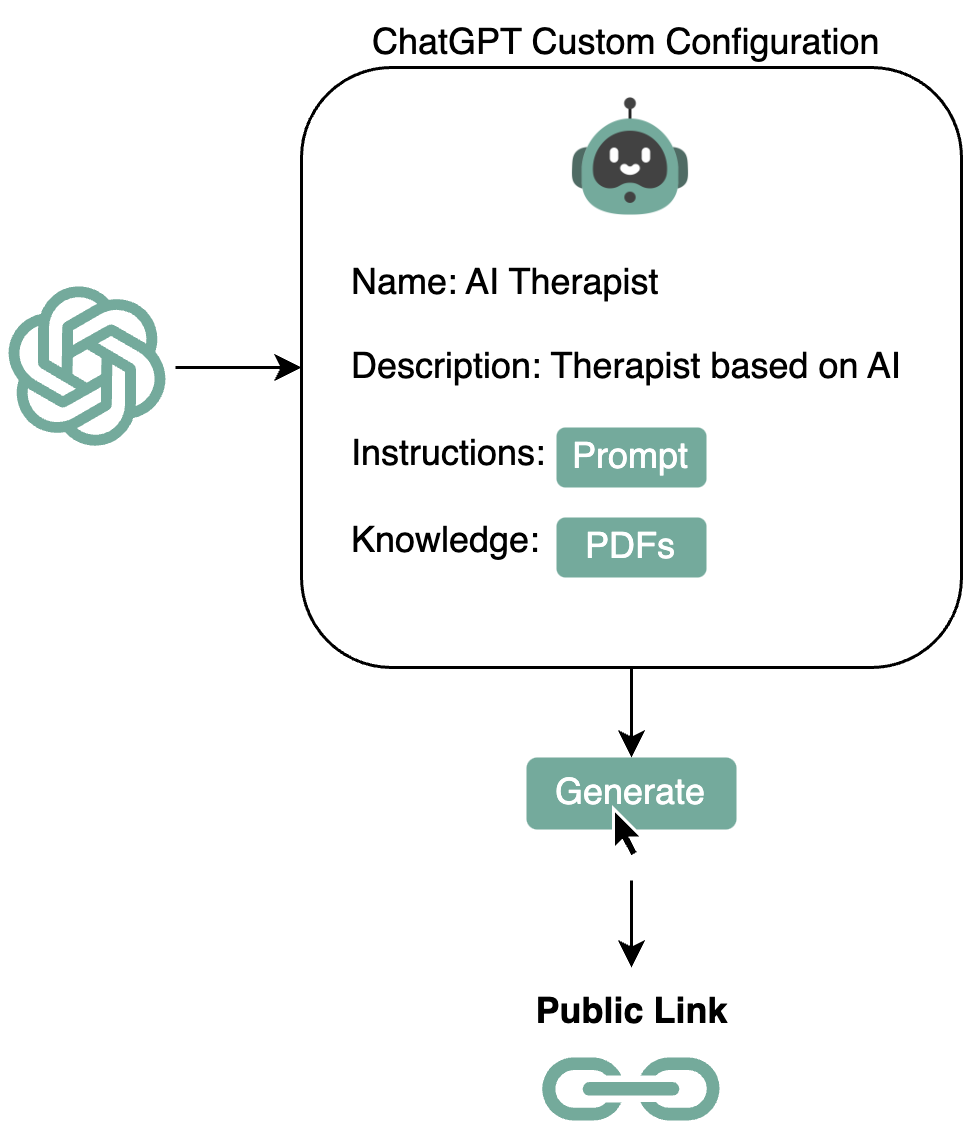
We are thrilled to share that our research paper has been published in the volume 9 of Healthcare Journal. Flowchart to generate a custom ChatGPT. Our latest research paper presents a pioneering study on the integration of ChatGPT, a large language model, into therapeutic settings for children with Attention Deficit Hyperactivity Disorder (ADHD). This work delves into how AI can significantly enhance ADHD treatment methods beyond conventional pharmacological approaches. By employing the Delphi method for systematic forecasting and involving a panel of child ADHD therapy experts, the study assesses ChatGPT’s effectiveness in simulated therapy scenarios. It explores ChatGPT’s capabilities in empathy, adaptability, and communication, aiming for a responsible integration of AI into healthcare to positively impact therapy and patient care. While showcasing the potential benefits of ChatGPT in ADHD care, such as personalization and accessibility, it also highlights the need for enhancements in privacy, cultural sensitivity, and interpreting nonverbal cues. The study emphasizes the importance of merging technological innovation with a comprehensive understanding of patient needs and ethical considerations, paving the way for a new era of AI-assisted therapy .
From the Classroom to the Workplace – AI Technologies and the Changing Face of Education
15 Feb 2024 • Ignacio Garcia
The Oxford Internet Institute and TUM Campus Heilbronn Webinar Series brings together researchers from the University of Oxford and TUM Heilbronn Campus to discuss various topics concerning AI and educational technologies. The focus lies on the current development state and on ensuring the responsible advancement of AI technologies to promote efficiency, fairness, and risk awareness.
Embarking on Innovation: iPraktikum Summer 2024 Prep Begins!
25 Jan 2024 • Maximilian Sölch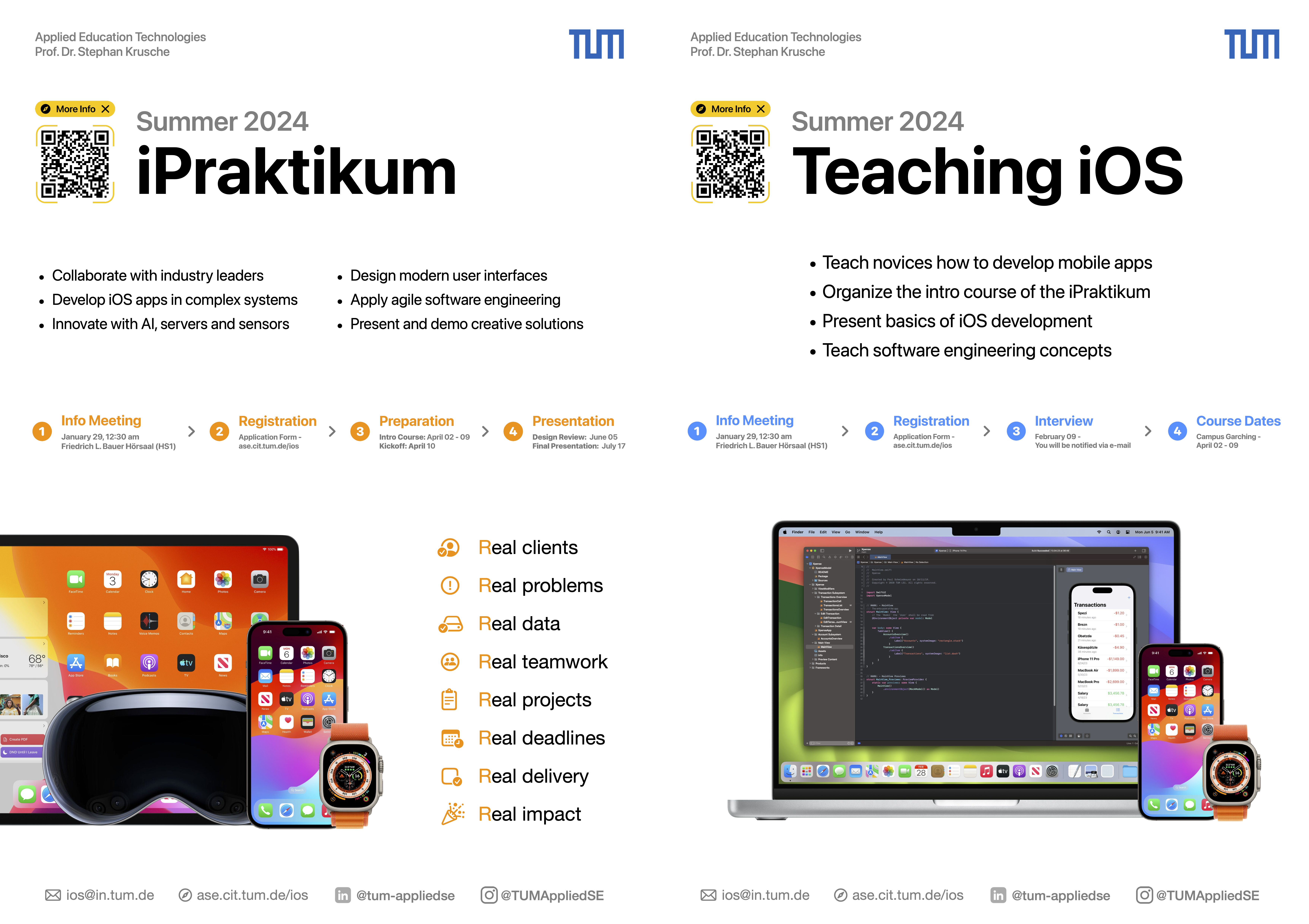
Get ready to dive into a journey where your development skills meet real-world impact! 🚀 Join us for the 27th edition of the iPraktikum at TUM Applied Education Technologies in partnership with Apple’ AATCe program in the summer 2024. This is a great opportunity to shape the future with your own hands 🌍✨ You do not only learn but you innovate, create, and contribute to society in meaningful ways while you become an industry-ready software engineer.
Generative AI Taskforce - featuring Stephan Krusche
15 Jan 2024 • Ignacio Garcia
The Generative AI Taskforce at the TUM Think Tank brings together a diverse team of experts and researchers who provide guidance to decision makers in government, industry, and civil society on issues related toi the design, governance and use of generative AI technology. In a recent episode they held a brief interview with Prof. Dr. Stephan Krusche, where he shares his vision of the future role of GenAI in education. Watch on
Breaking Barriers: Highlighting Female Perspectives in Computer Science Education at TUM
10 Jan 2024 • Stephan Krusche
This week, the Technical University of Munich experienced a great moment in computer science education, marked by the exceptional contributions of four young women: Jana Nina Friedrich, Jasmina Vulovic, Lena Kahle, and Andrea Solanas de Vicente. The whole lecture team in Heilbronn In the “Introduction to Programming” lecture series held in Heilbronn and Garching, these talented students, who also serve as tutors, led the sessions with remarkable skill and inspiration. As a professor in software engineering and education technologies, it was a rare and gratifying experience for me to observe their teaching, which was not only informative but also motivating.
Bali Calling: Paper Accepted for MoMM2023
27 Nov 2023 • Santiago Berrezueta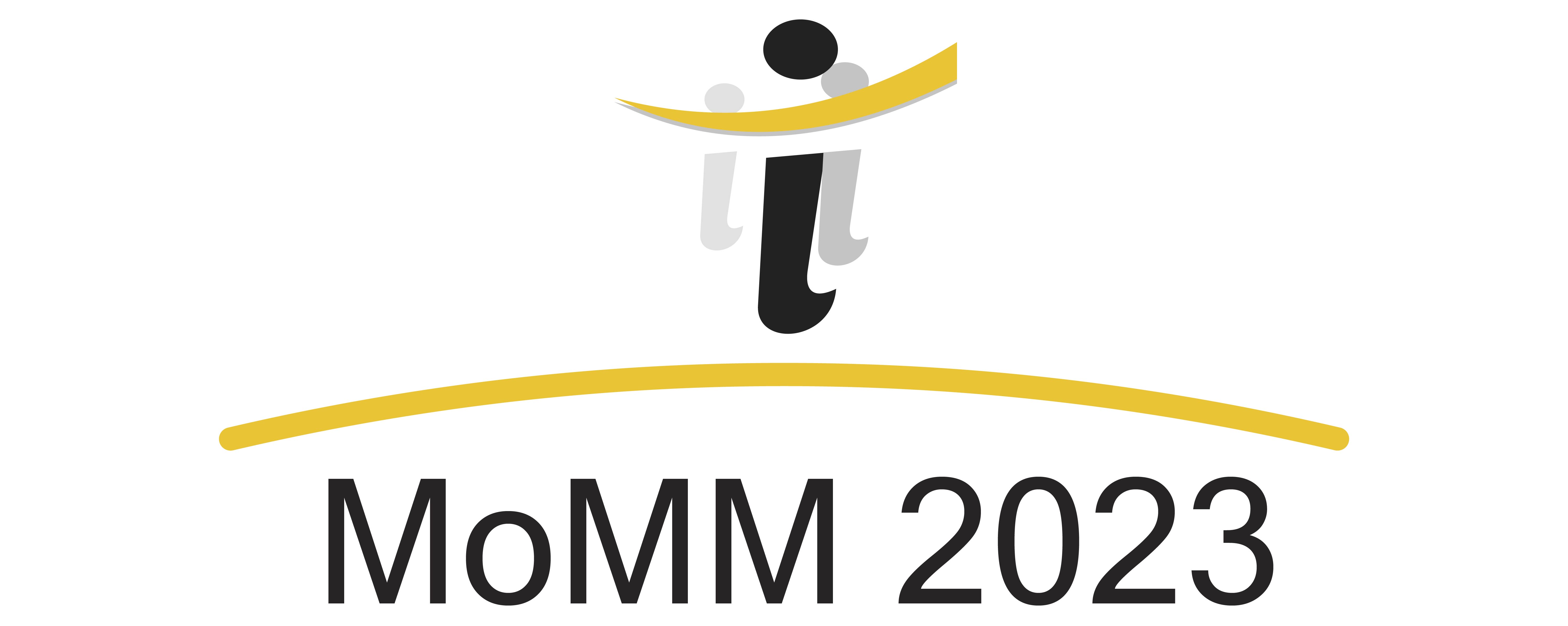
We are thrilled to share that our research paper has been accepted at the 21st International Conference on Advances in Mobile Computing & Multimedia Intelligence (MoMM 2023) in Bali, Indonesia. 21st International Conference on Advances in Mobile Computing & Multimedia Intelligence Our latest research paper introduces a transformative mobile application designed to support the occupational therapy for children with ADHD. This app, part of a comprehensive smart-home environment, enables therapists and parents to remotely observe and interact with children during therapy sessions.
Koli Calling 2023 - Paper Accepted - Constructive Alignment in Modern Computing Education: An Open-Source Computer-Based Examination System
2 Nov 2023 • Matthias Linhuber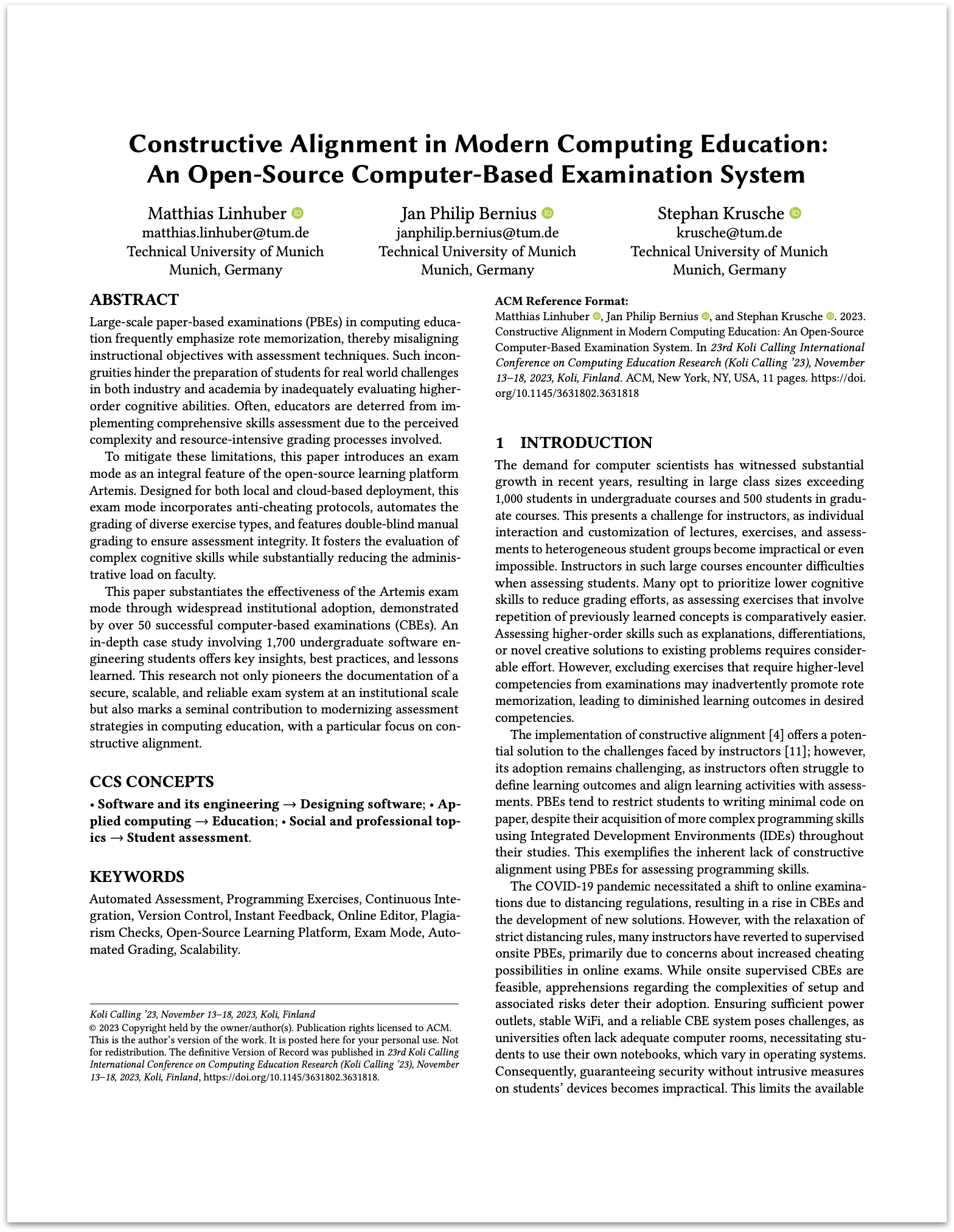
We are thrilled to share that our paper, “Constructive Alignment in Modern Computing Education: An Open-Source Computer-Based Examination System,” has been accepted at Koli Calling International Conference on Computing Education Research in Finland this year. In our research, we tackle a critical challenge in computing education: the disconnect between teaching aims and the evaluation methods in large-scale paper-based examinations (PBEs). Such exams often fail to assess the higher-order cognitive abilities that are essential for students to succeed in the fast-paced and complex tech industry.
Interview: AI in the center of our society
3 Aug 2023 • Stephan Krusche
In an interview in the magazine “Wirtschaftswoche”, Prof. Dr. Stephan Krusche discusses AI in the center of our society. With the establishment of a new data science center, TUM is placing a clear focus on data science and AI at the Heilbronn Campus. The current hype around AI-based language programs such as ChatGPT raises hopes, but also concerns. In the end, it all comes down to responsible use. Natural stupidity beats artificial intelligence any day," is a quote from British fantasy writer Sir Terry Pratchett. Or is it the other way around? In 2015, the computer program “AlphaGo” was able to bring the multiple European champion Fan Hui to his knees five times in the highly complex board game “Go”. AI has gained enormous relevance. This applies to all areas: Society, business and science. Here, AI is closely linked to data science. “AI also uses data science to train and improve algorithms,” explains Prof. Stephan Krusche from the TUM School of Computation, Information and Technology (CIT) at the Heilbronn Campus.
Two articles on ChatGPT with Stephan Krusche
13 Jul 2023 • Stephan Krusche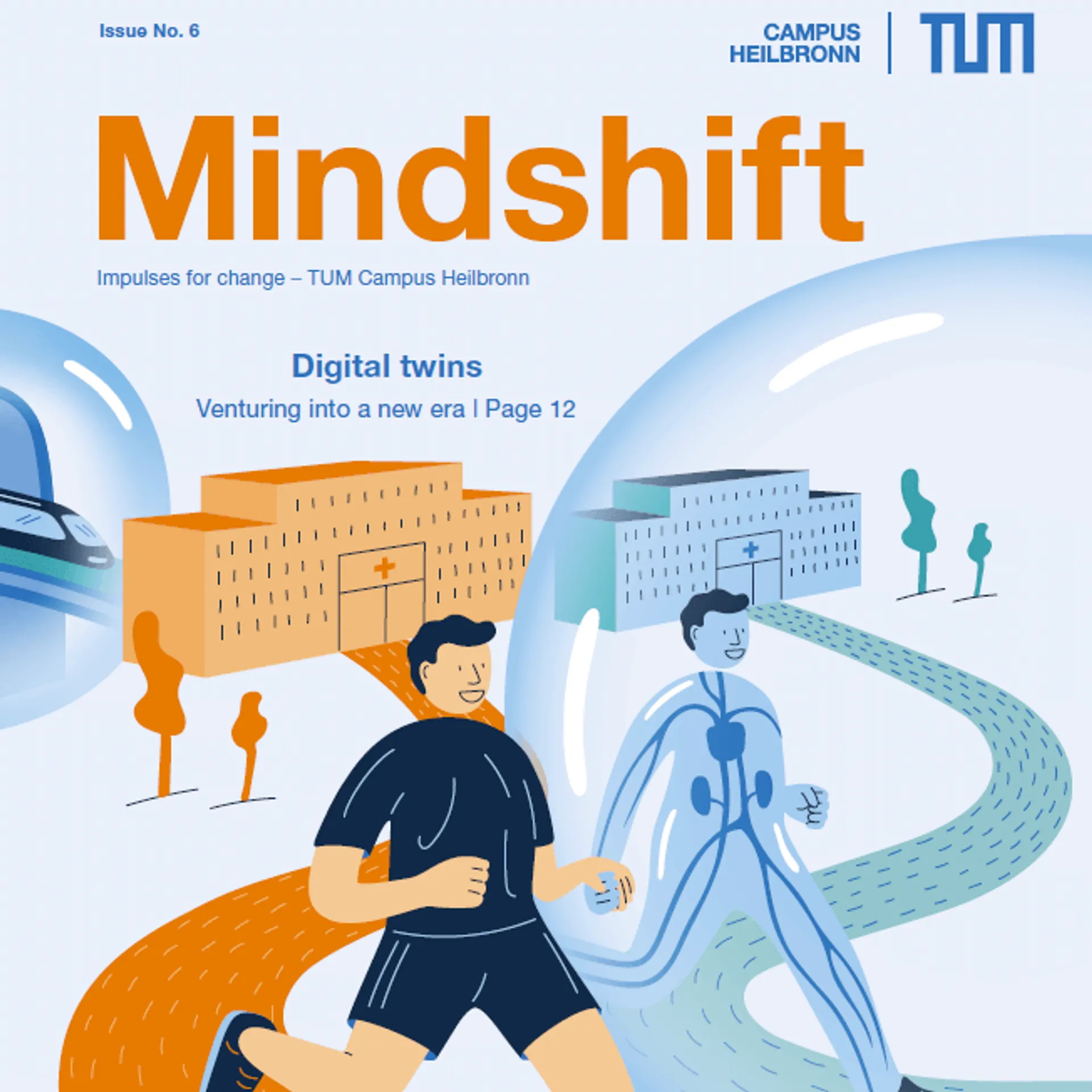
In an example of synergetic collaboration between industry and academia, two media articles have been published that delve into the world of ChatGPT. The articles feature insightful opinions with former Microsoft CTO Dr. Andreas Braun and Prof. Dr. Stephan Krusche. This collaboration addresses key issues and challenges and underscores the convergence of industry and academia in their pursuit of knowledge and innovation. With their expertise and shared commitment, they shed light on the symbiotic relationship that drives transformative progress and provide insights into how data science and AI are driving progress in an ever-evolving world.
Tokyo Calling: Remarkable Four Papers Accepted for CSEE&T 2023
10 Jul 2023 • Maximilian Sölch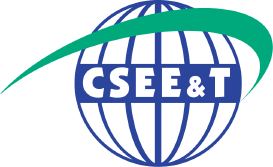
We are thrilled to announce that four research papers have been accepted at the 35th IEEE International Conference on Software Engineering Education and Training (CSEE&T 2023) in Tokyo, Japan. 35th IEEE International Conference on Software Engineering Education and Training Accepted papers address various topics in software engineering education ranging from recommendations for programming exercises to overcome ChatGPT, online vs. on-site instruction for programming courses, and interactive learning for programming to plagiarism detection and its impact on learning, highlighting the breadth and depth of our research efforts.
IRIS - Towards AI-driven Interactive Learning
6 Jul 2023 • Patrick Bassner
The future of learning is taking shape and Artemis is at the heart of this transformation. We are delighted to announce the development of an intelligent virtual tutor IRIS which is based on Generative AI and Large Language Models (LLMs). We currently develop IRIS as part of the practical course Interactive Learning and integrate it into Artemis. IRIS will support students in solving (programming) tasks. With the introduction of IRIS, we aim to provide effective one-on-one assistance at any time without the need for human tutors’ interaction to support students in their learning process. IRIS is designed to assist students in gaining deep understanding and knowledge, while simultaneously fostering confidence and autonomy while learning. This is accomplished by considering individual learning needs and providing personalized support around the clock.
We want you! Looking for tutors for Introduction to Programming in WS23-24 🚀
30 Jun 2023 • Patrick Bassner
We invite motivated students like you to join the teaching team for the Introduction to Programming course in the winter semester of 2023/24. This is a unique opportunity to deepen your software engineering and programming skills while helping your peers. As a tutor, you hold tutor groups, correct exercises, help students understand the concepts, participate in the exam correction, and help with lecture and exercise organization.
Best Practitioner Report Award for the Paper "Integrating Competency-Based Education in Interactive Learning Systems"
17 Mar 2023 • Maximilian Sölch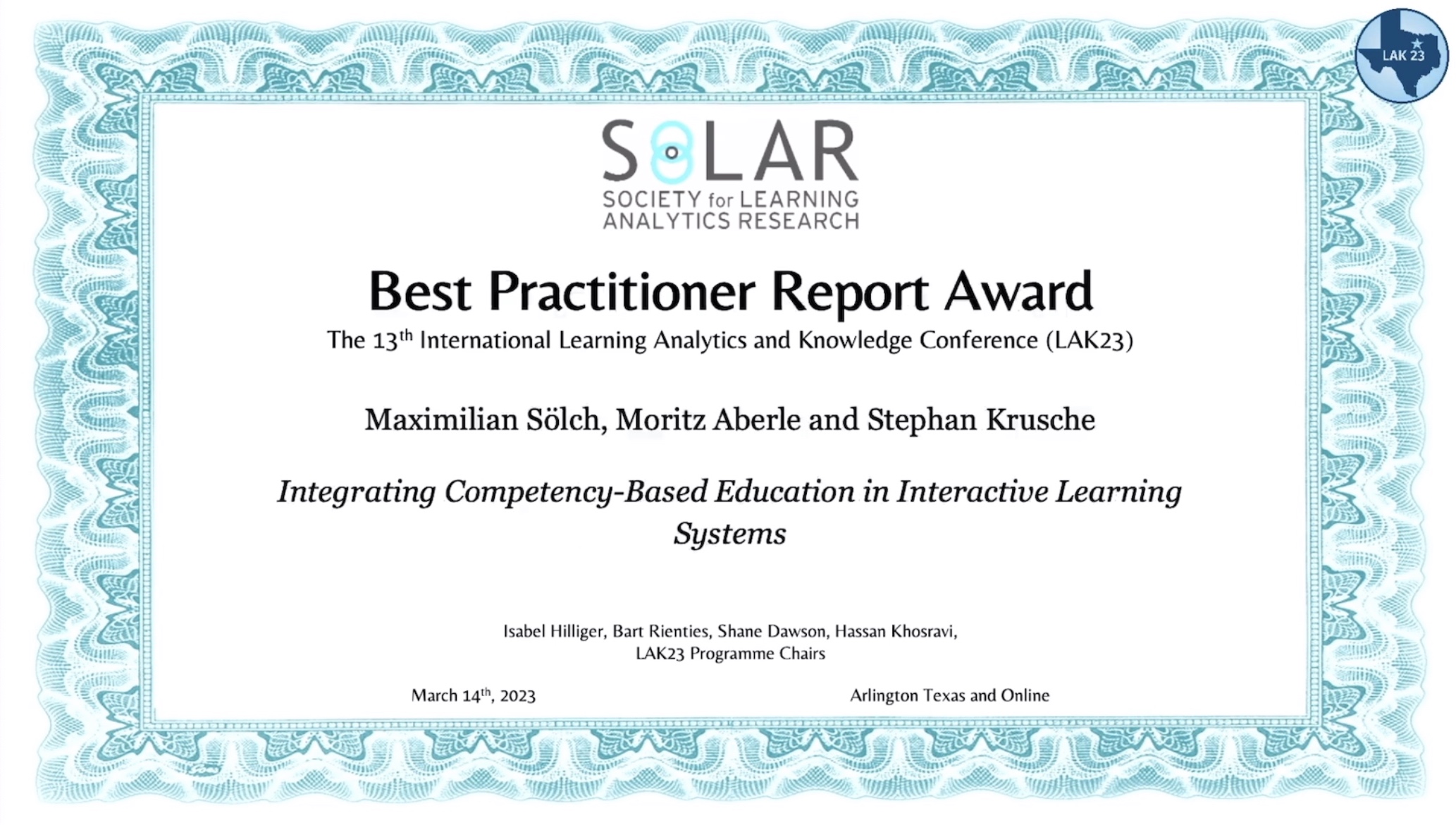
The paper “Integrating Competency-Based Education in Interactive Learning Systems” by Maximilian Sölch, Moritz Aberle, and Stephan Krusche received the best practitioner report award for this year’s International Conference on Learning Analytics & Knowledge (LAK23). You can read the published paper on the SOLAR website here. Best Practitioner Report Award for the Paper "Integrating Competency-Based Education in Interactive Learning Systems" Citation Integrating Competency-Based Education in Interactive Learning Systems (Best Practitioner Report Award). Maximilian Sölch, Moritz Aberle, and Stephan Krusche. 13th International Conference on Learning Analytics & Knowledge (LAK23 ) . Arlington, TX, USA, March 2023. doi: 10.48550/ARXIV.2309.12343
Team from Camerloher-Gymnasium Freising among the winners of the bavarian P-Seminar Prize
12 Mar 2023 • Stephan KruscheWith the topic “Design and development of an escape room for the Mathematics lessons for lower and middle school”, a team of students Camerloher-Gymnasium Freising is now among the winners of the Bavarian State P-Seminar Prize, with mathematics as the main subject. The team wanted to name the Chair for Applied Software Technology as an external partner because some members of the group learned important programming skills and agile development methods in the Introduction to Software Engineering lecture ,offered by this chair in Summer 2021. The seminar was structured according to the Kanban method and the game architecture was based on the model of the small games developed in the tutorials.
New conference paper: "Balancing between Creativity and Efficiency in Software Engineering Project Courses"
22 Feb 2023 • Jan Philip Bernius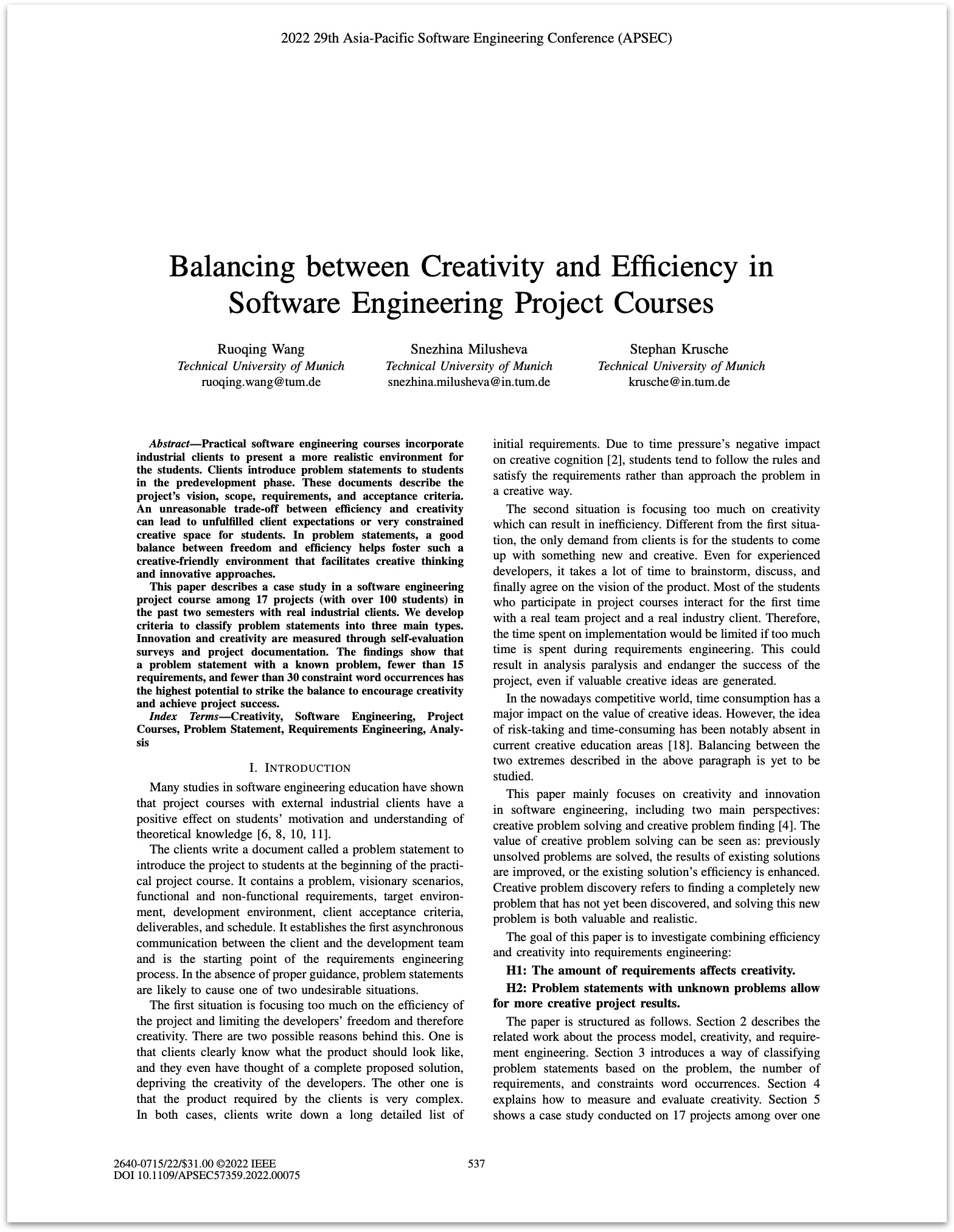
The paper titled “Balancing between Creativity and Efficiency in Software Engineering Project Courses” by Ruoqing (Sunny) Wang, Snezhina Milusheva, and Stephan Krusche was presented at the 29th Asia-Pacific Software Engineering Conference in December. The proceedings are now published on IEEE Xplore. You can already read the preprint here. "Balancing between Creativity and Efficiency in Software Engineering Project Courses" by Ruoqing Wang, Snezhina Milusheva, and Stephan Krusche Abstract—Practical software engineering courses incorporate industrial clients to present a more realistic environment for the students. Clients introduce problem statements to students in the predevelopment phase. These documents describe the project’s vision, scope, requirements, and acceptance criteria. An unreasonable trade-off between efficiency and creativity can lead to unfulfilled client expectations or very constrained creative space for students. In problem statements, a good balance between freedom and efficiency helps foster such a creative-friendly environment that facilitates creative thinking and innovative approaches. This paper describes a case study in a software engineering project course among 17 projects (with over 100 students) in the past two semesters with real industrial clients. We develop criteria to classify problem statements into three main types. Innovation and creativity are measured through self-evaluation surveys and project documentation. The findings show that a problem statement with a known problem, fewer than 15 requirements, and fewer than 30 constraint word occurrences has the highest potential to strike the balance to encourage creativity and achieve project success.
New conference paper: "Integrating Competency-Based Education in Interactive Learning Systems"
14 Feb 2023 • Jan Philip Bernius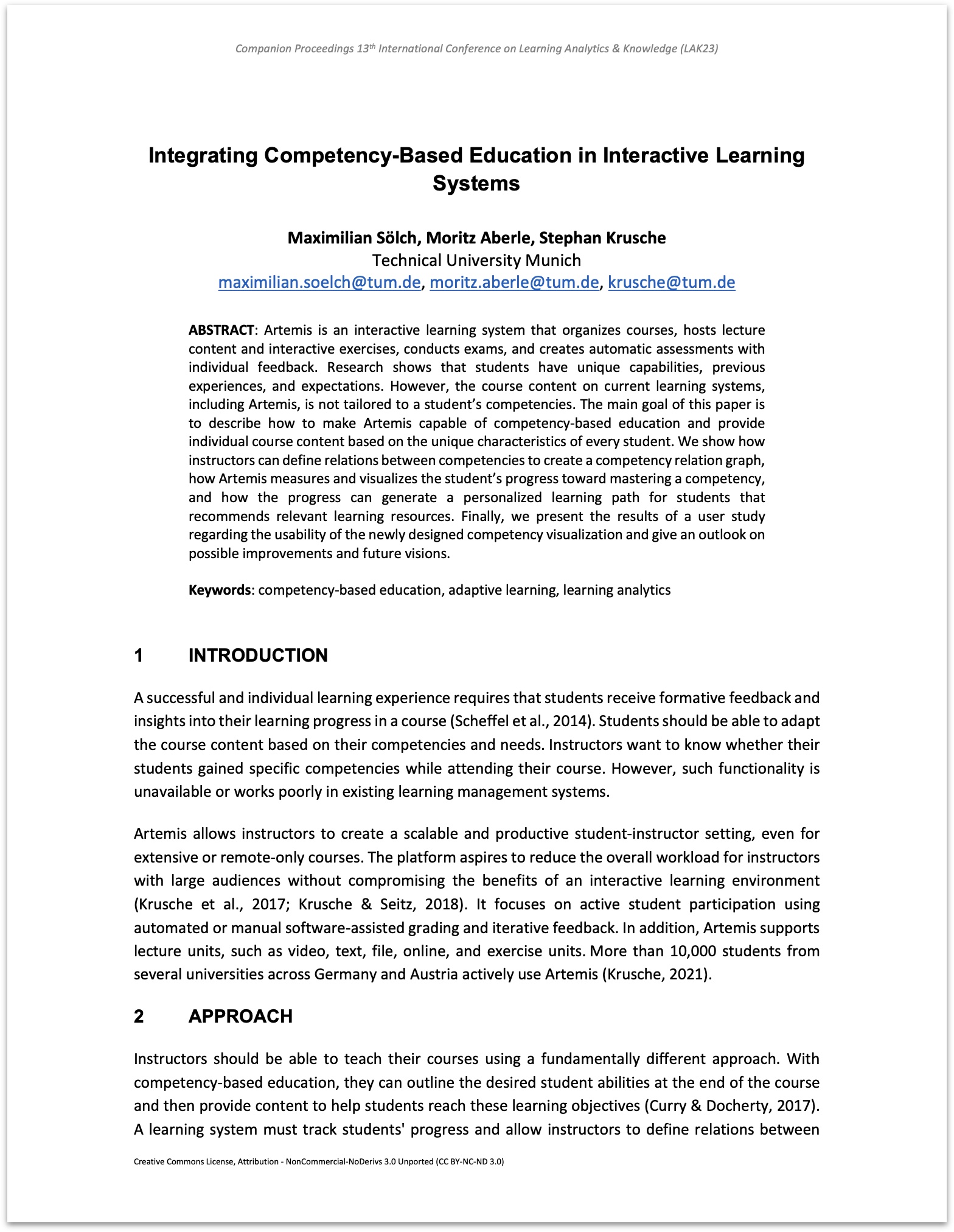
The paper titled “Integrating Competency-Based Education in Interactive Learning Systems” by Maximilian Sölch, Moritz Aberle, and Stephan Krusche was accepted for this years International Conference on Learning Analytics & Knowledge. You can already read the preprint here. "Integrating Competency-Based Education in Interactive Learning Systems" by Maximilian Sölch, Moritz Aberle, and Stephan Krusche Abstract—Artemis is an interactive learning system that organizes courses, hosts lecture content and interactive exercises, conducts exams, and creates automatic assessments with individual feedback. Research shows that students have unique capabilities, previous experiences, and expectations. However, the course content on current learning systems, including Artemis, is not tailored to a student’s competencies. The main goal of this paper is to describe how to make Artemis capable of competency-based education and provide individual course content based on the unique characteristics of every student. We show how instructors can define relations between competencies to create a competency relation graph, how Artemis measures and visualizes the student’s progress toward mastering a competency, and how the progress can generate a personalized learning path for students that recommends relevant learning resources. Finally, we present the results of a user study regarding the usability of the newly designed competency visualization and give an outlook on possible improvements and future visions.
Ferienakademie 2023
12 Feb 2023 • Stephan Krusche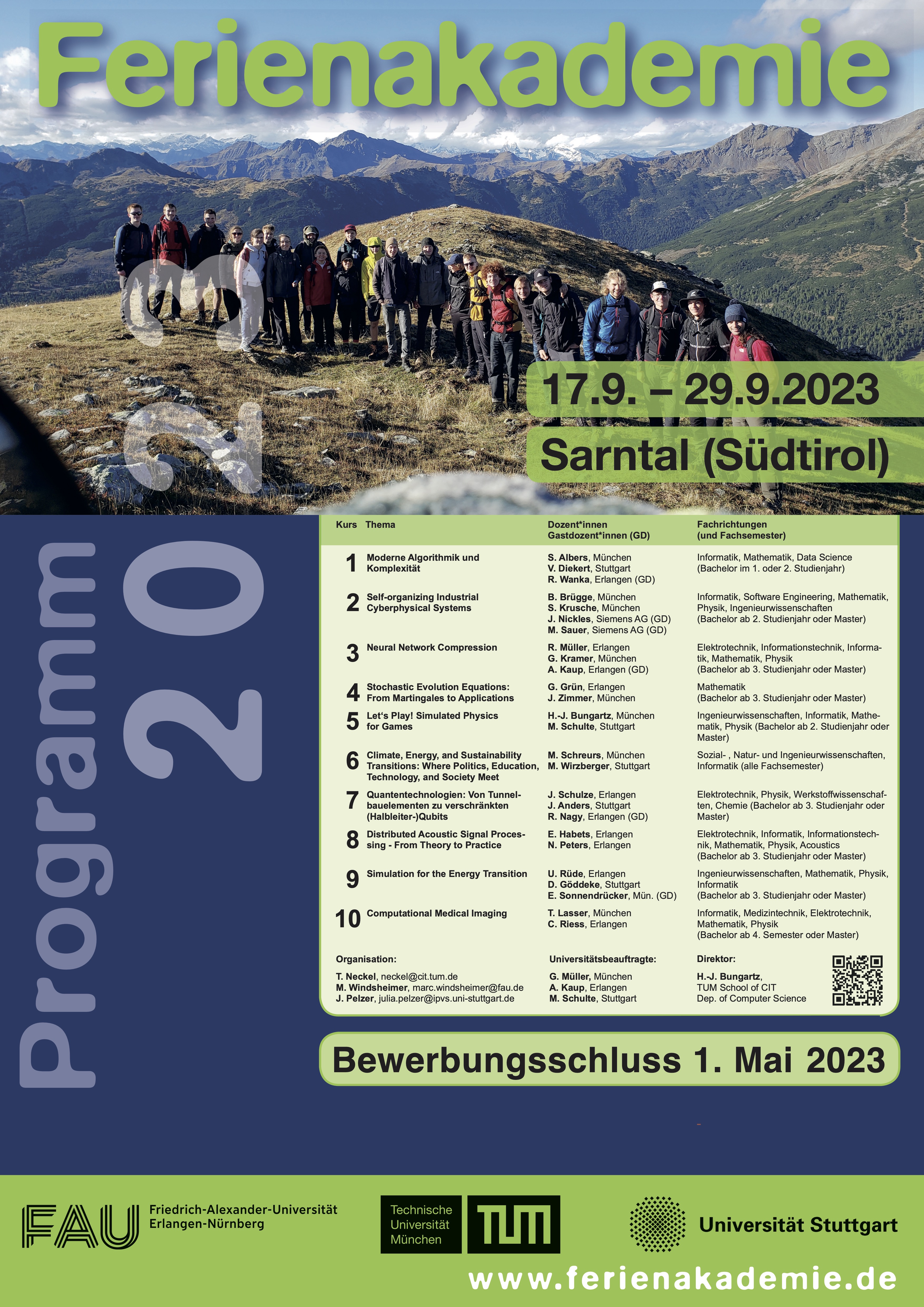
Prof. Bernd Brügge and Prof. Stephan Krusche with Jochen Nickles and Markus Sauer from Siemens and will organize the course 2 Self-organizing Industrial Cyberphysical Systems in the Ferienakademie in September 2023 in Sarntal, Italy. This is a great opportunity to improve your programming and software engineering skills when working on innovative solutions for the future, work in a motivated team and have a lot of fun while making connections to relevant industry partners.
Recap: iPraktikum Client Acceptance Test
10 Feb 2023 • Philipp Zagar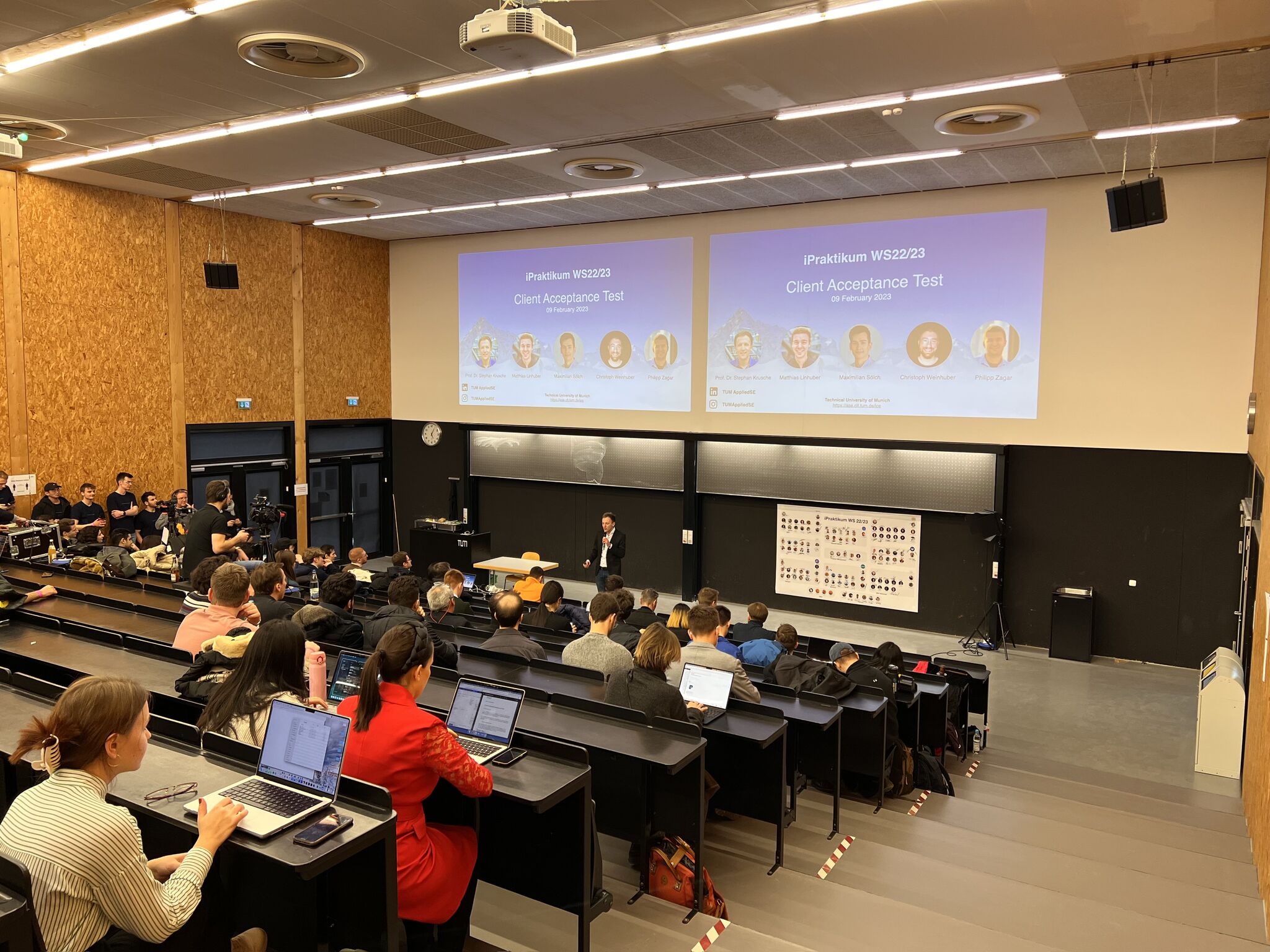
Yesterday, all eight projects in the iPraktikum presented their final product in the Client Acceptance Test! The teams gave a ten minute presentation about their system’s main features as well as the increments achieved since the Design Review. Magic show by Serapion (Prof. Bernd Brügge) assisted by Dr. Jan Philip Bernius.
iPraktikum: Client Acceptance Test
9 Feb 2023 • Matthias Linhuber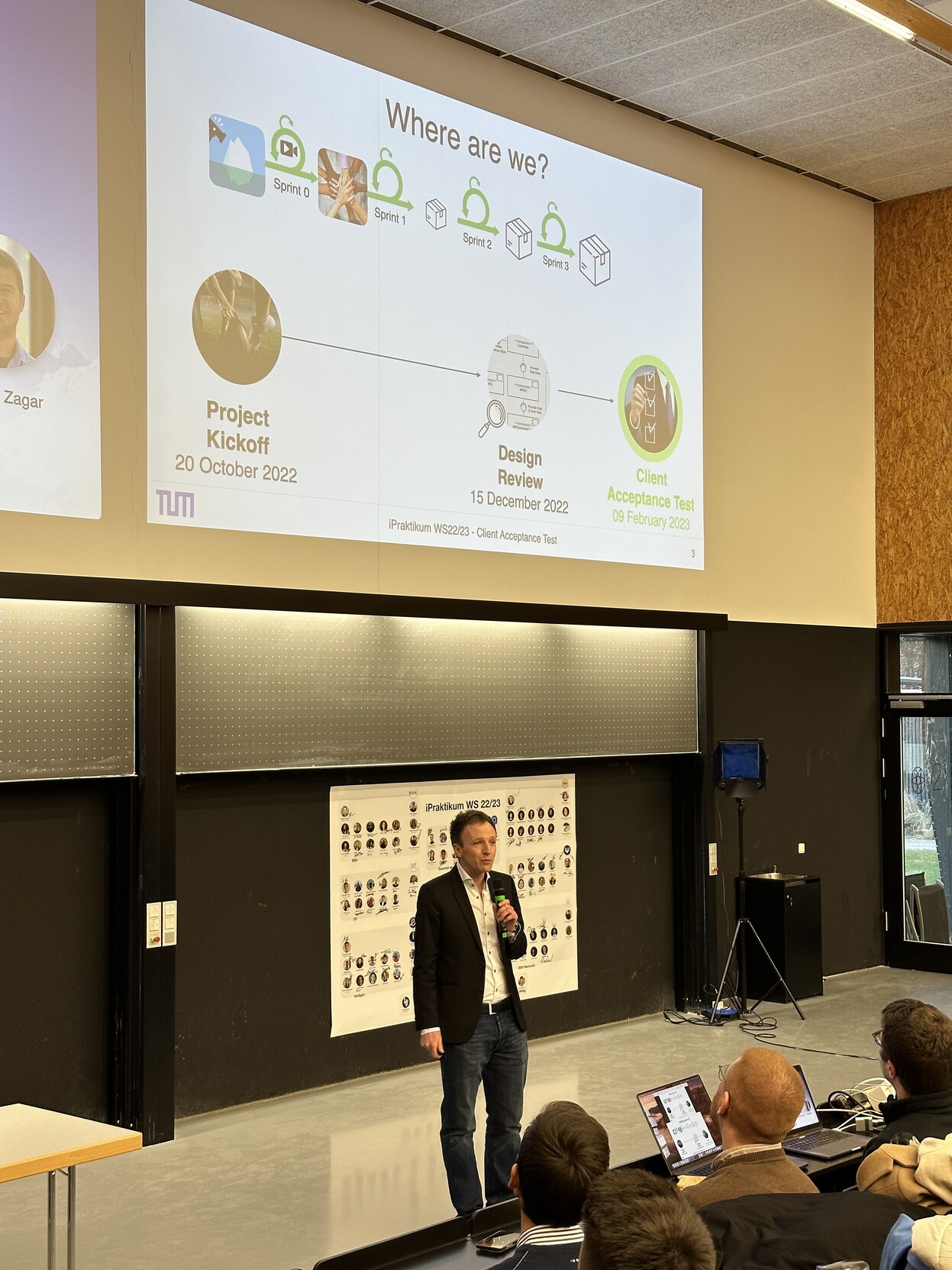
Here we go! Our Professor Stephan Krusche just kicked off the Client Acceptance Test of the iPraktikum 22/23! Can’t wait to see what our students came up with!
ChatGPT for Good?
7 Feb 2023 • Jan Philip Bernius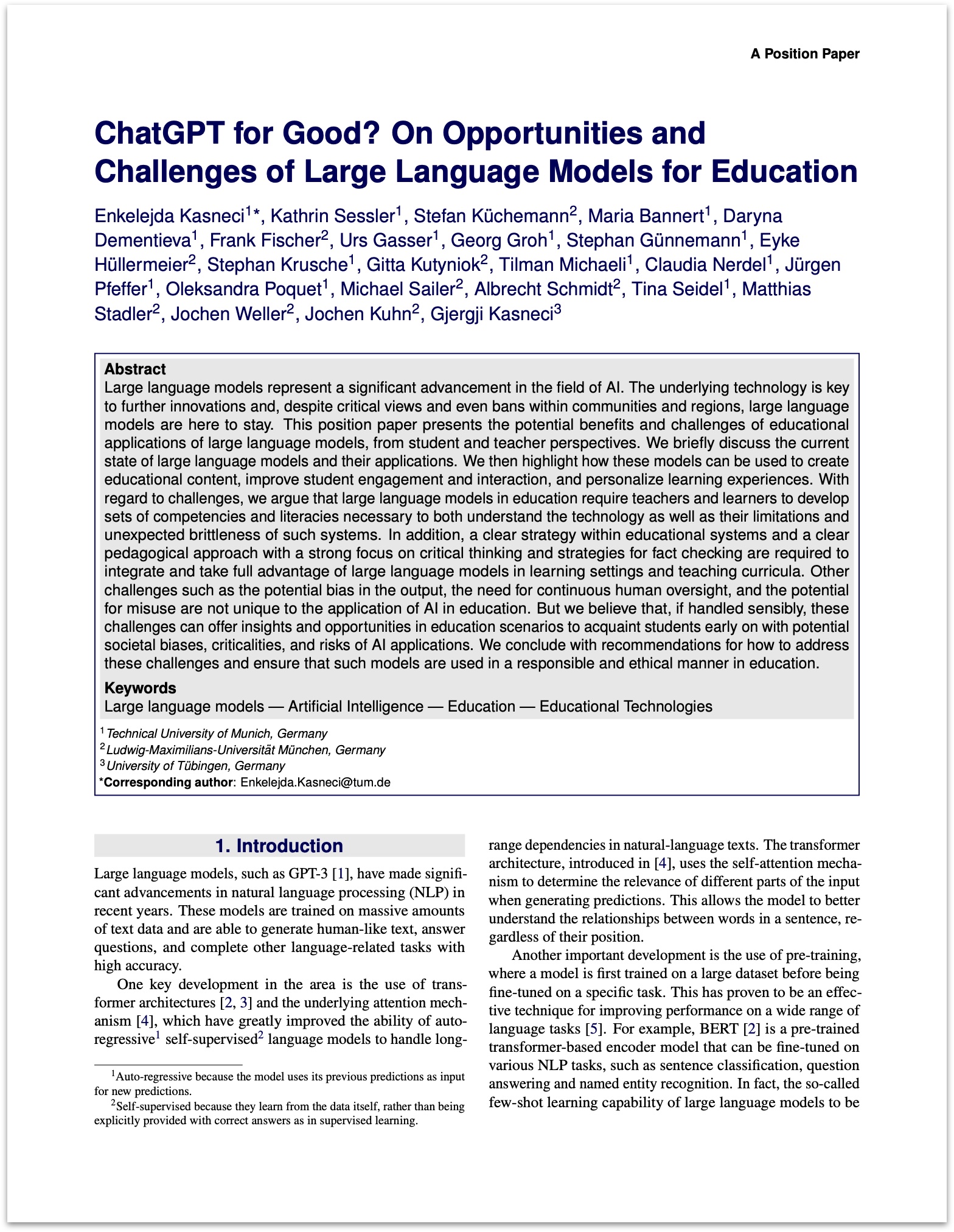
From personalized learning to critical thinking and other pertinent challenges, learn how large language models (LLM) can revolutionize the way we teach & learn. Take a look at our position paper from Technical University of Munich and Ludwig Maximilian University of Munich: edarxiv.org/5er8f ChatGPT for Good? On Opportunities and Challenges of Large Language Models for Education Abstract—Large language models represent a significant advancement in the field of AI. The underlying technology is key to further innovations and, despite critical views and even bans within communities and regions, large language models are here to stay. This position paper presents the potential benefits and challenges of educational applications of large language models, from student and teacher perspectives. We briefly discuss the current state of large language models and their applications. We then highlight how these models can be used to create educational content, improve student engagement and interaction, and personalize learning experiences. With regard to challenges, we argue that large language models in education require teachers and learners to develop sets of competencies and literacies necessary to both understand the technology as well as their limitations and unexpected brittleness of such systems. In addition, a clear strategy within educational systems and a clear pedagogical approach with a strong focus on critical thinking and strategies for fact checking are required to integrate and take full advantage of large language models in learning settings and teaching curricula. Other challenges such as the potential bias in the output, the need for continuous human oversight, and the potential for misuse are not unique to the application of AI in education. But we believe that, if handled sensibly, these challenges can offer insights and opportunities in education scenarios to acquaint students early on with potential societal biases, criticalities, and risks of AI applications. We conclude with recommendations for how to address these challenges and ensure that such models are used in a responsible and ethical manner in education.
Hackathon in a train? Yes, please!
19 Jan 2023 • Philipp Zagar
Presentation to mobile consultants in Hamburg Last week one of the iPraktikum teams, specifically the Netlight Team, had a unique opportunity to go on a trip to Copenhagen. The goal was to get a more holistic understanding of the Netlight consulting company by experiencing their offices in Hamburg and Copenhagen. The students travelled to Copenhagen sustainably by train with a stop in Hamburg, each ride took approximately five hours. But how to make use of these ~20 hours? It turned out that travelling by train is a good opportunity to be productive and develop an iOS application! Why?
iPraktikum: Design Review
19 Dec 2022 • Philipp Zagar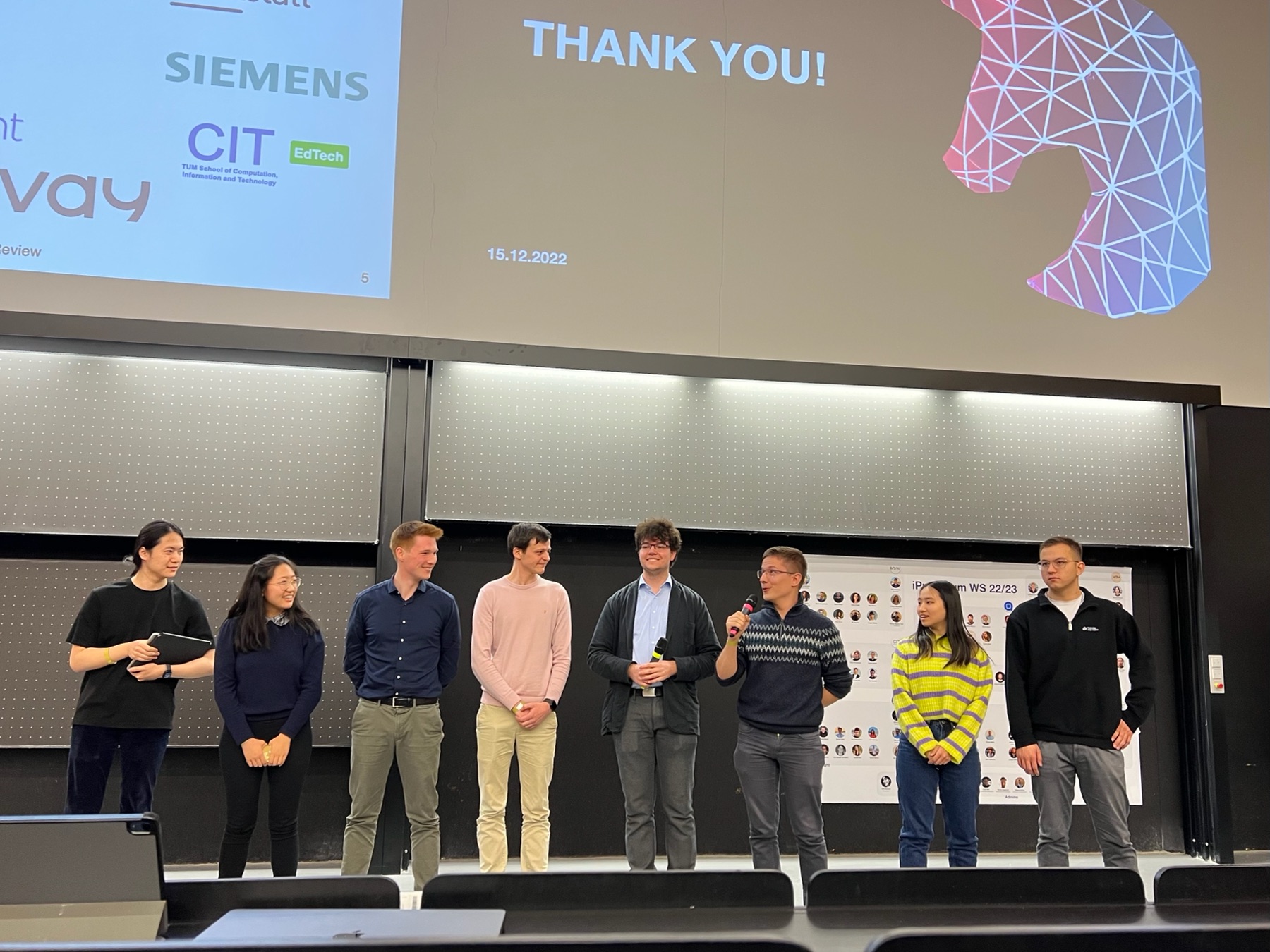
Our students nocked it out of the park in this semesters iPraktikum Design Review! We can’t wait to see what they will achieve until the final presentations in February!
iPraktikum: Fourth course-wide lecture
17 Nov 2022 • Philipp Zagar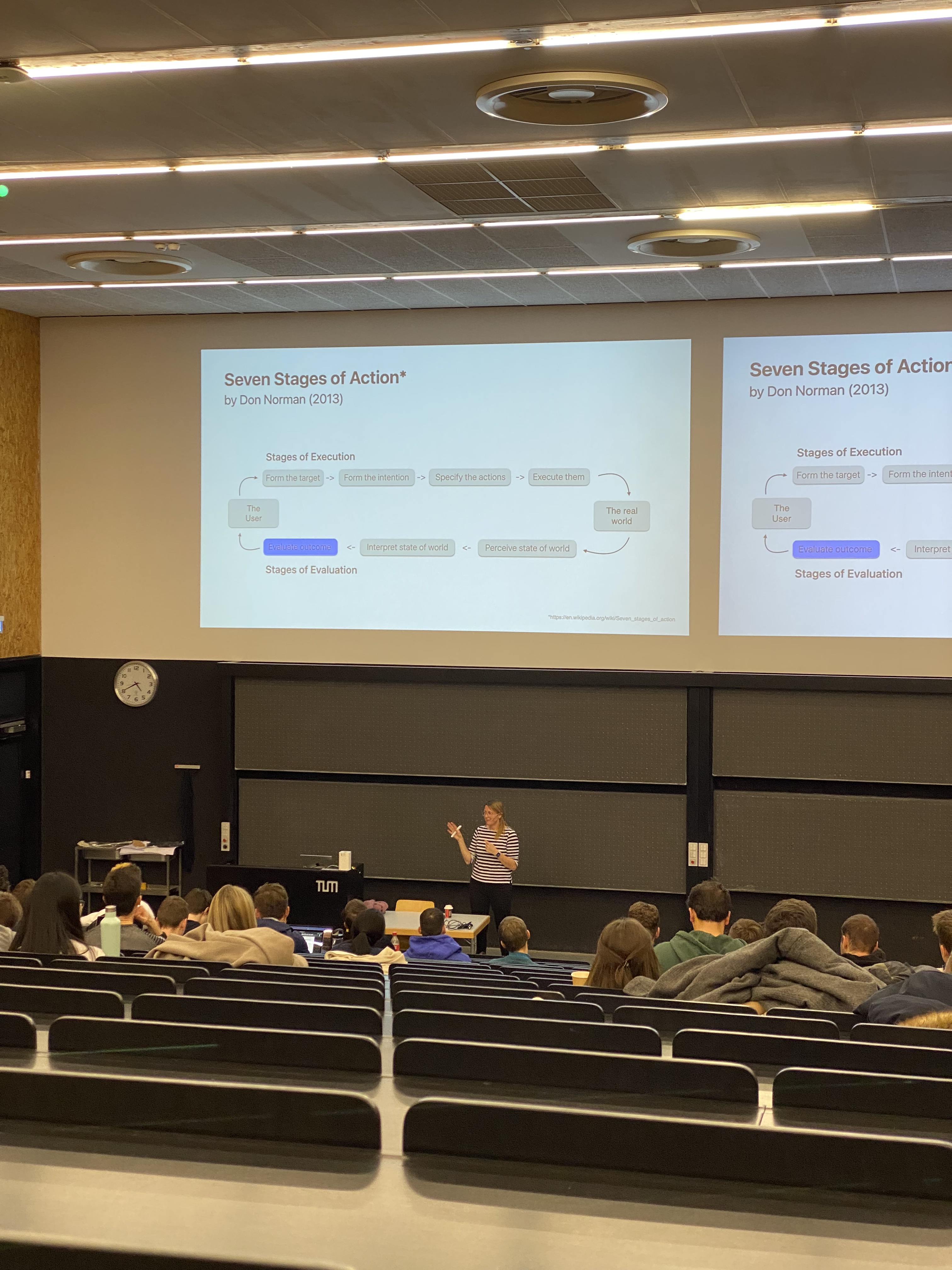
Our guest speaker Manu Rink nocked it out of the park today! Thank you for your awesome session on UI/UX!
Doctoral seminar November 2022
11 Nov 2022 • Philipp Zagar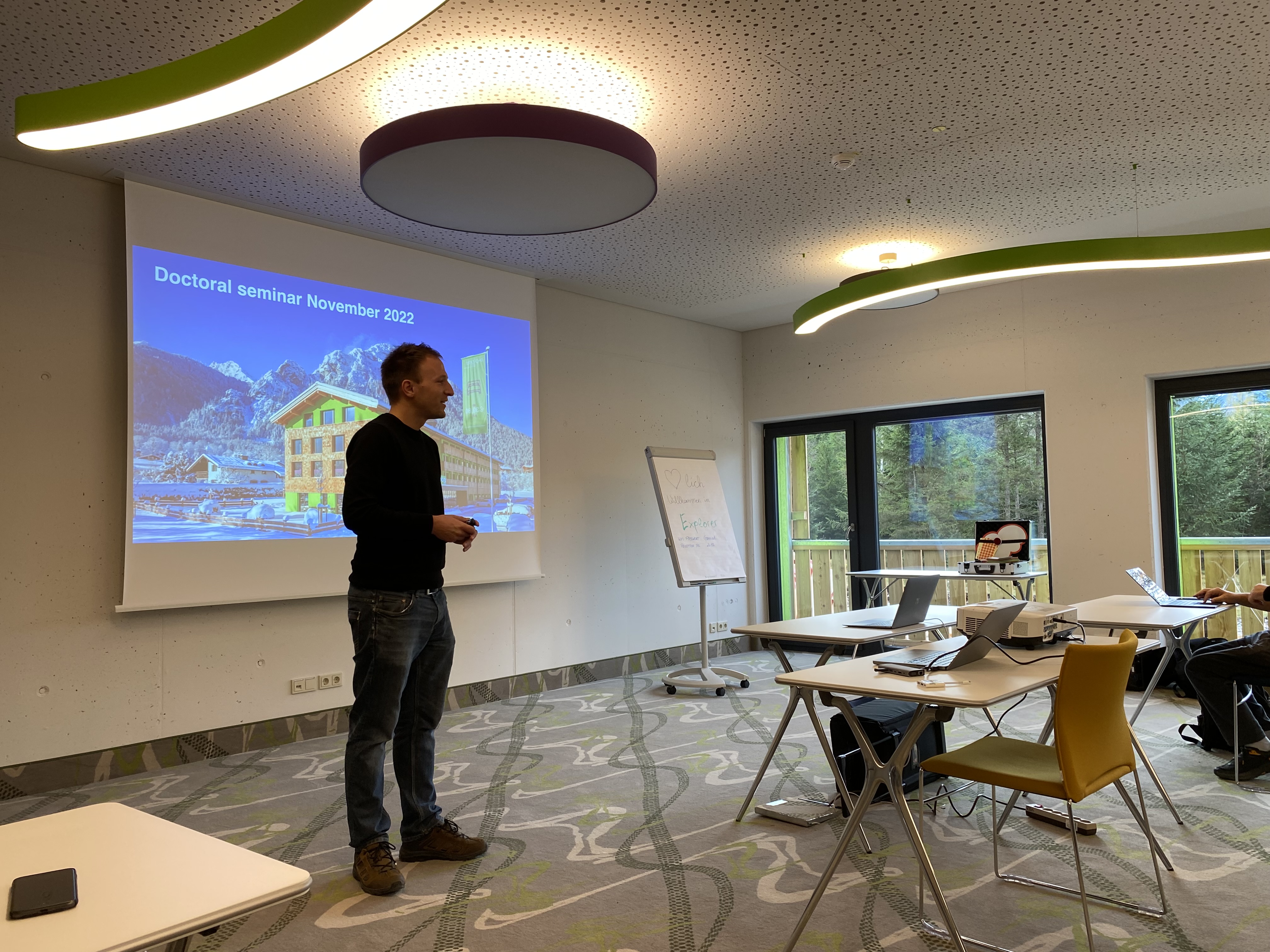
Many great presentations, lots of discussions and plenty of feedback! Our first doctoral seminar after the pandemic was a full success! A big thank you to all our group members! Prof. Stephan Krusche just kicked off this years doctoral seminar! Team picture: Patrick Bassner, Philipp Zagar, Stephan Krusche, Snezhina Milusheva, Markus Paulsen, Jan Philip Bernius, Evgeny Volynsky, Matthias Linhuber, Bernd Brügge, Maximilian Sölch, Santiago Berrezueta (Right to left)
iPraktikum: Third course-wide lecture
10 Nov 2022 • Matthias Linhuber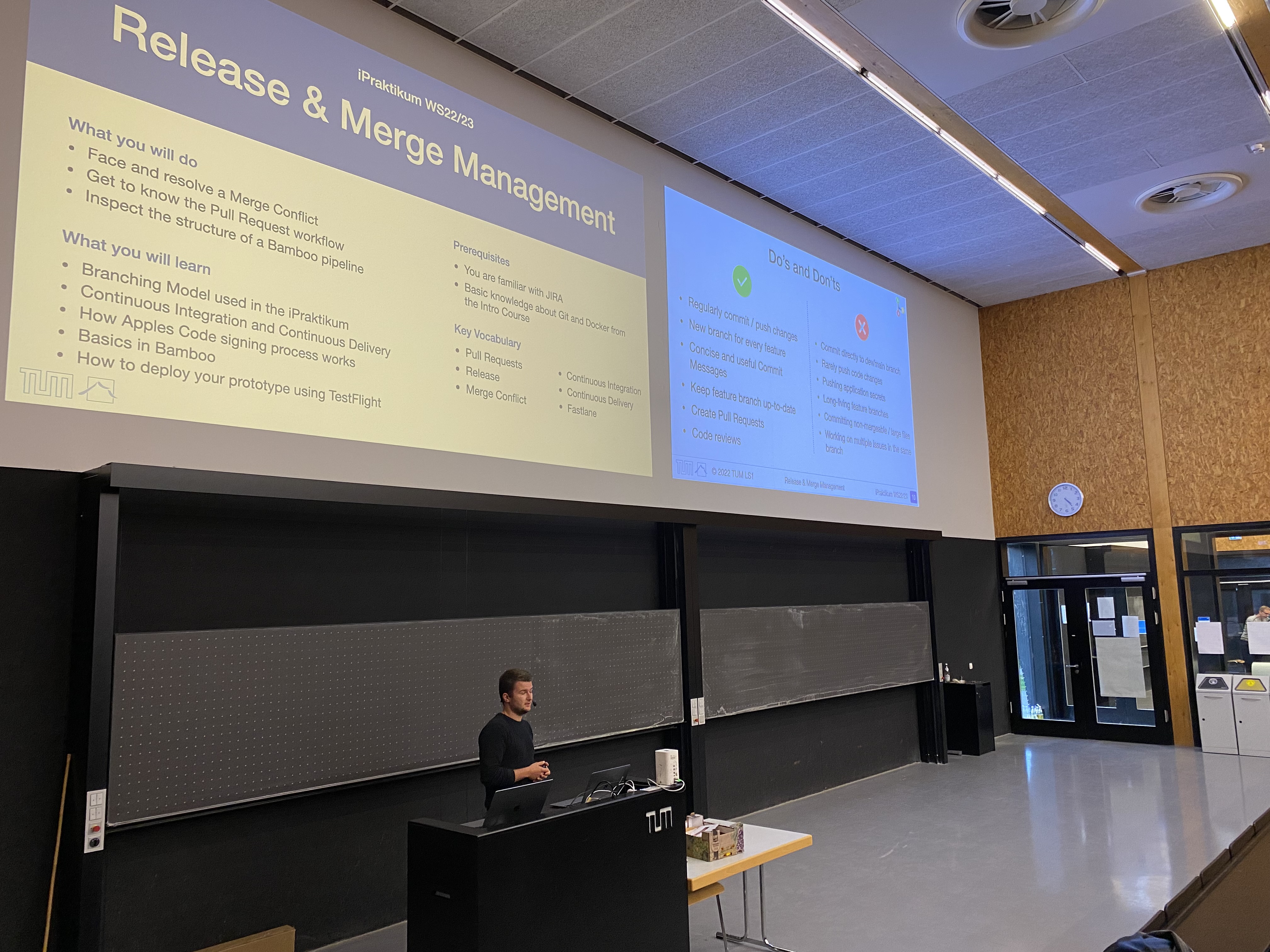
Week 3 in the iPraktikum course wide lectures is all about release and merge management. Philipp Zagar kicks things off with version control Do‘s and Don’ts!
iPraktikum: Second course-wide lecture
3 Nov 2022 • Philipp Zagar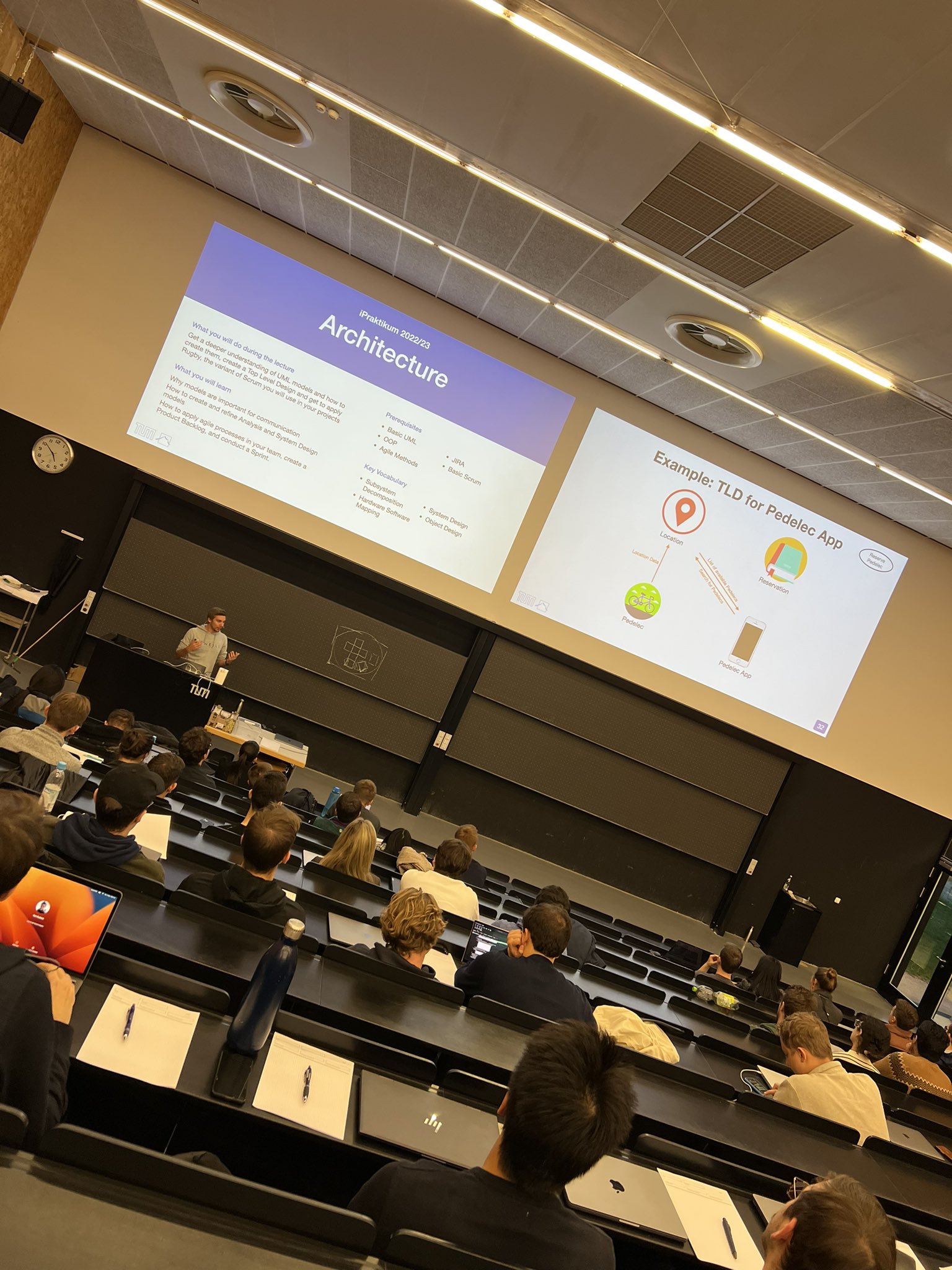
The second course-wide lecture of the iPraktikum is currently held by Matthias Linhuber!
Recap: iPraktikum Project Kickoff
26 Oct 2022 • Philipp Zagar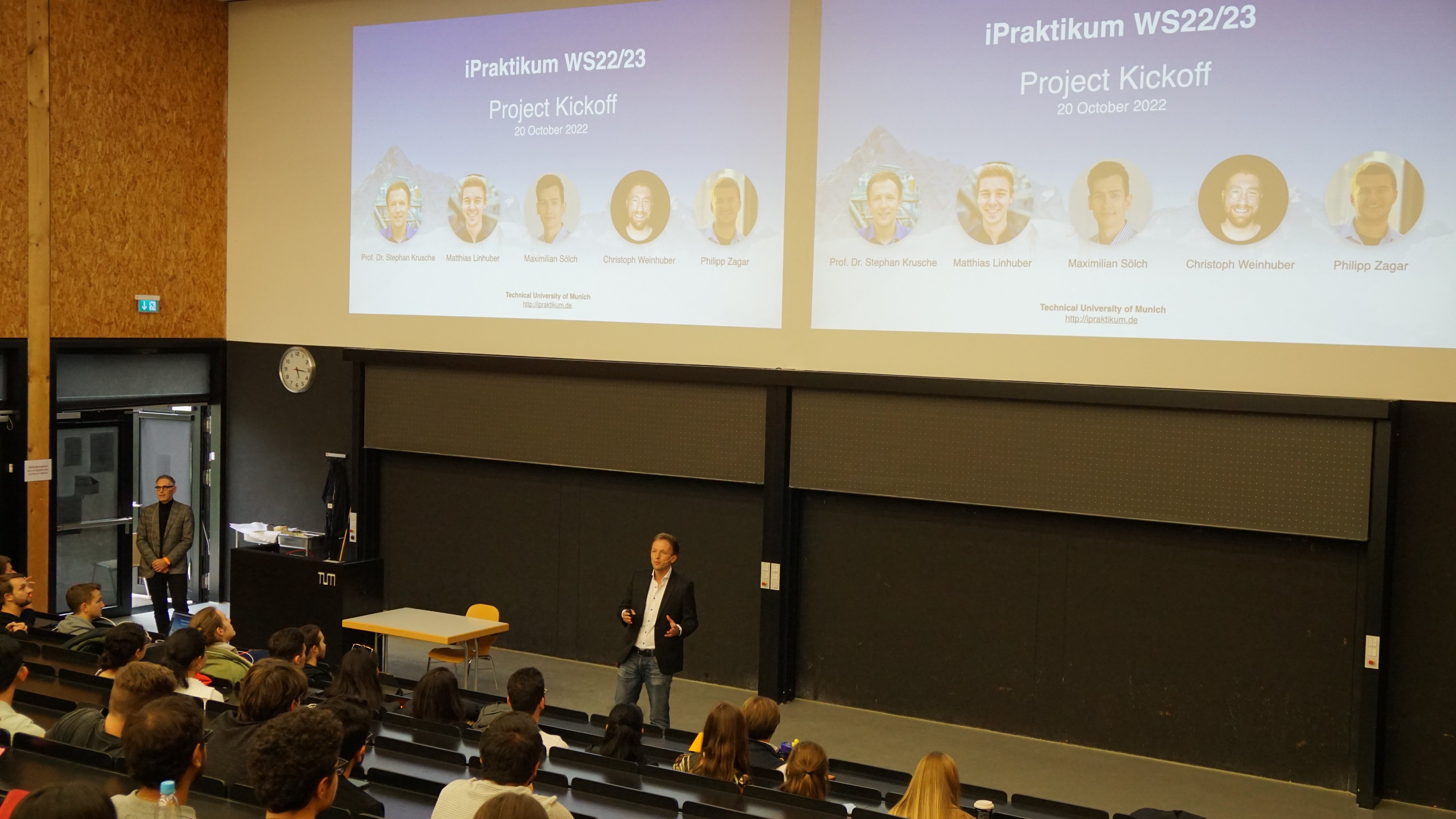
Last week the iPraktikum started with the Project Kickoff! All eight customers presented their problem statements to the students and clarified questions in a networking buffet afterward. We’re super excited about the semester and the great progress that all teams will achieve.
Helma Schneider: 40+ Years!
20 Oct 2022 • Pramod Bhatotia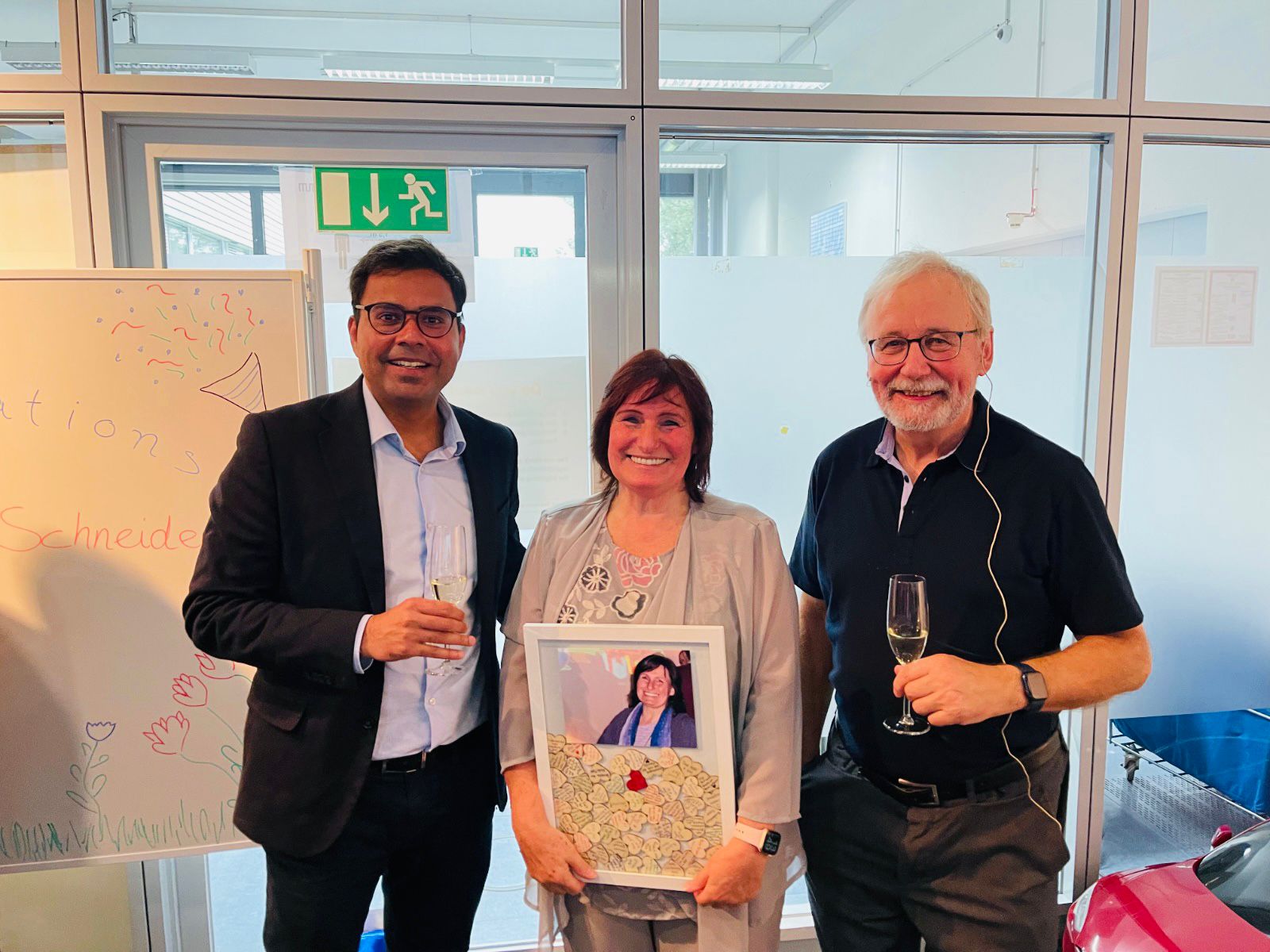
Today we celebrated 40+ years of service for our dearest Helma. Congratulations on your retirement and fantastic career at TUM. We will miss you at the chair! Left to right: Prof. Dr.-Ing. Pramod Bhatotia, Helma Schneider, and Prof. Dr. Bernd Brügge.
iPraktikum: Project Kickoff
20 Oct 2022 • Philipp Zagar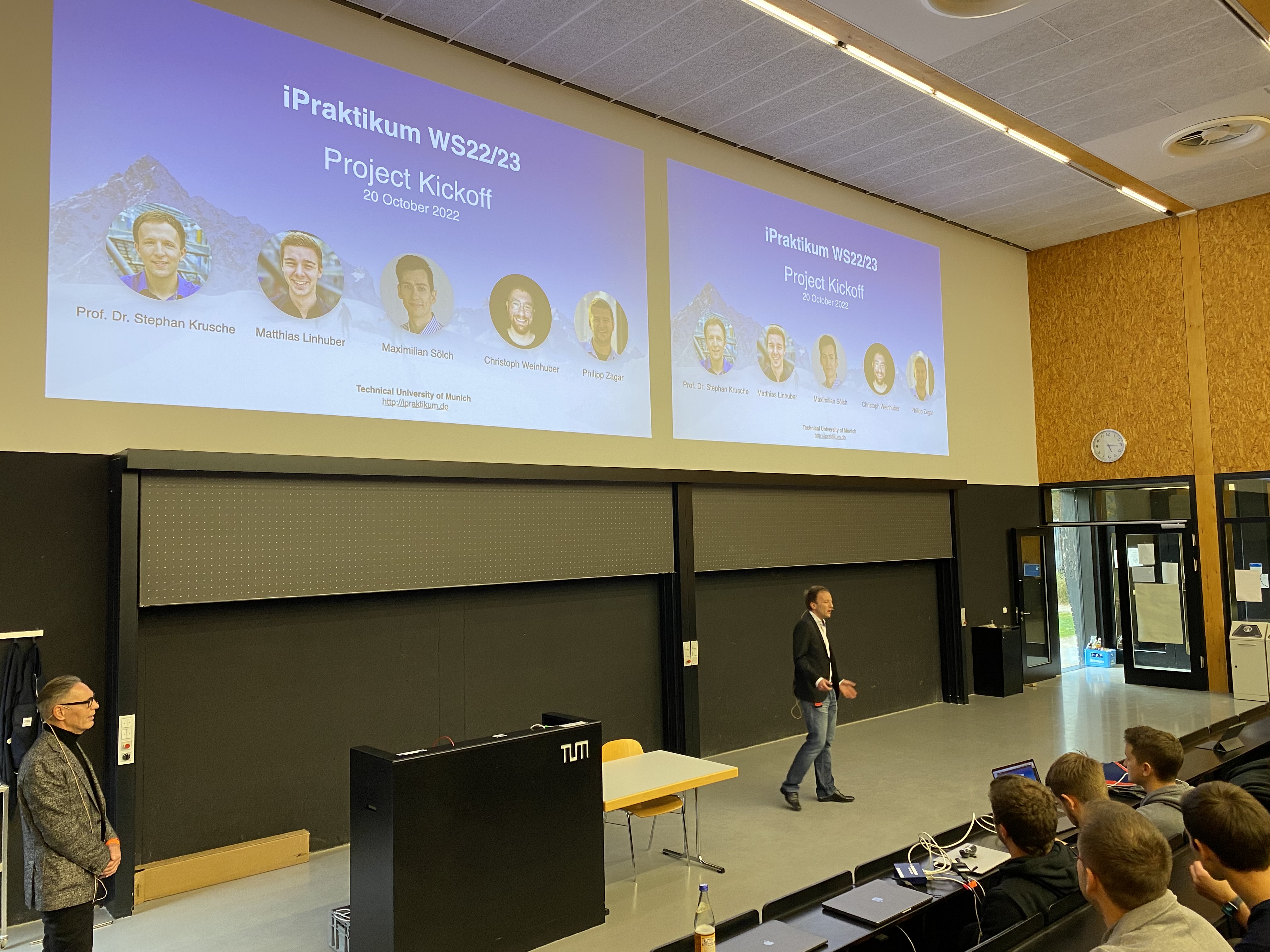
We‘re rolling again! Prof. Stephan Krusche just kicked off this years iPraktikum with 8 great customers and projects! Can’t wait to see what the students come up with!
iPraktikum: Swift Intro Course
14 Oct 2022 • Philipp Zagar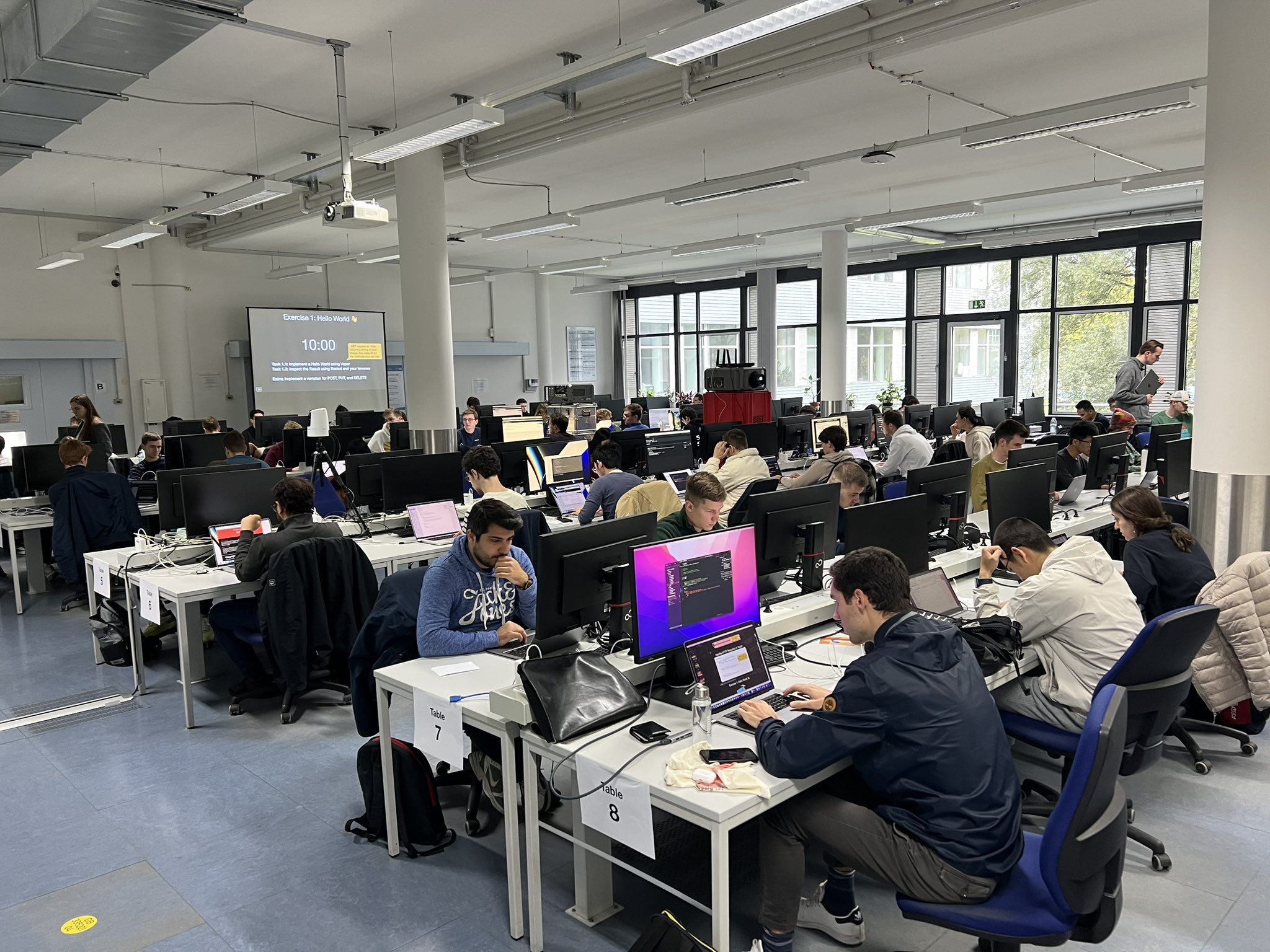
In the past five days, we organized the Swift Intro Course for the iPraktikum with around 70 students. Our amazing tutors worked really hard to make sure that all students were able to follow us on our Swift journey.
New article: "Machine Learning Based Feedback on Textual Student Answers in Large Courses"
4 Jun 2022 • Jan Philip Bernius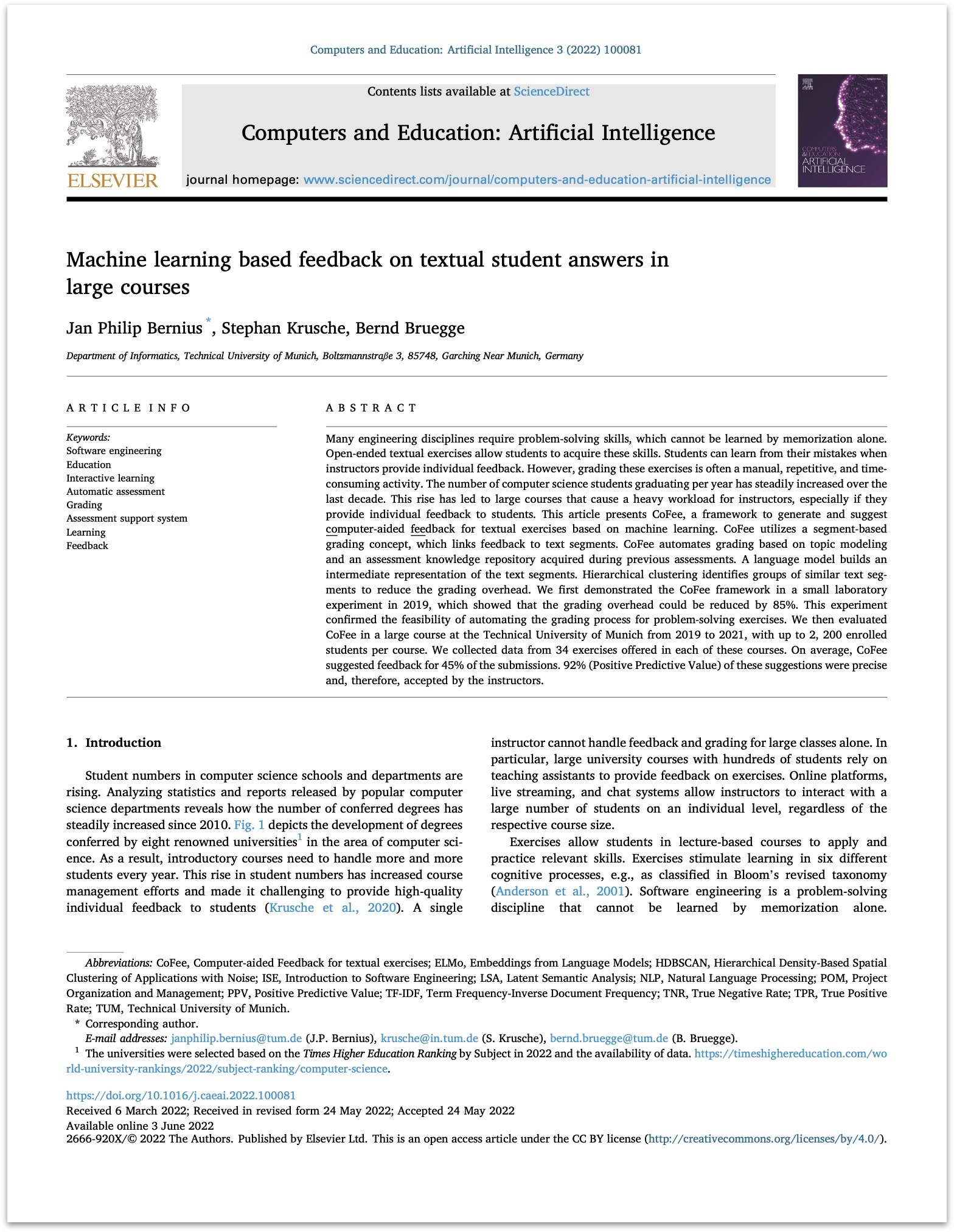
The journal pre-prof of the article “Machine Learning Based Feedback on Textual Student Answers in Large Courses” by Jan Philip Bernius, Stephan Krusche, and Bernd Brügge is now available as Open Access on ScienceDirect! Machine Learning Based Feedback on Textual Student Answers in Large Courses by Jan Philip Bernius, Stephan Krusche, and Bernd Brügge Abstract—Many engineering disciplines require problem-solving skills, which cannot be learned by memorization alone. Open-ended textual exercises allow students to acquire these skills. Students can learn from their mistakes when instructors provide individual feedback. However, grading these exercises is often a manual, repetitive, and time-consuming activity. The number of computer science students graduating per year has steadily increased over the last decade. This rise has led to large courses that cause a heavy workload for instructors, especially if they provide individual feedback to students. This article presents CoFee, a framework to generate and suggest computer-aided feedback for textual exercises based on machine learning. CoFee utilizes a segment-based grading concept, which links feedback to text segments. CoFee automates grading based on topic modeling and an assessment knowledge repository acquired during previous assessments. A language model builds an intermediate representation of the text segments. Hierarchical clustering identifies groups of similar text segments to reduce the grading overhead. We first demonstrated the CoFee framework in a small laboratory experiment in 2019, which showed that the grading overhead could be reduced by 85%. This experiment confirmed the feasibility of automating the grading process for problem-solving exercises. We then evaluated CoFee in a large course at the Technical University of Munich from 2019 to 2021, with up to 2, 200 enrolled students per course. We collected data from 34 exercises offered in each of these courses. On average, CoFee suggested feedback for 45% of the submissions. 92% (Positive Predictive Value) of these suggestions were precise and, therefore, accepted by the instructors.
Jan Philip Bernius, Stephan Krusche, and Bernd Brügge Receive Ernst Otto Fischer Teaching Award
3 Aug 2021 • Bernd BrüggeJan Philip Bernius, Stephan Krusche, and Bernd Brügge received the Ernst Otto Fischer Teaching Award. The award honors the innovative and successful teaching project Automatic Correction of Free-Text Assignments. The Ernst Otto Fischer Teaching Award is presented to instructors for innovative projects that improving teaching at TUM. The project Automatic Correction of Free-Text Assignments was funded by the TUM Teaching Fund. As part of the project, we implemented the Athena system for automated assessment of textual exercises. We used Athena as part of Artemis in the “Introduction to Software Engineering” lecture with > 2.000 participating students. In addition, we published the project results in the paper “A Machine Learning Approach for Suggesting Feedback in Textual Exercises in Large Courses” at the ACM Conference on Learning @ Scale 2021.
Jan Philip Bernius receives first prize in ACM Student Research Competition
16 Apr 2021 • Bernd Brügge
Jan Philip Bernius received the first prize in the ACM Student Research Competition as part of the 52nd ACM Technical Symposium on Computer Science Education (SIGCSE'21) for his submission “Toward Computer-Aided Assessment of Textual Exercises in Very Large Courses.” Judges from the ACM SIGCSE community determined the winners from 20 accepted peer-reviewed paper submissions in two presentation rounds. In round 1, all contestants presented their posters. The resulting six finalists presented their papers in round 2.